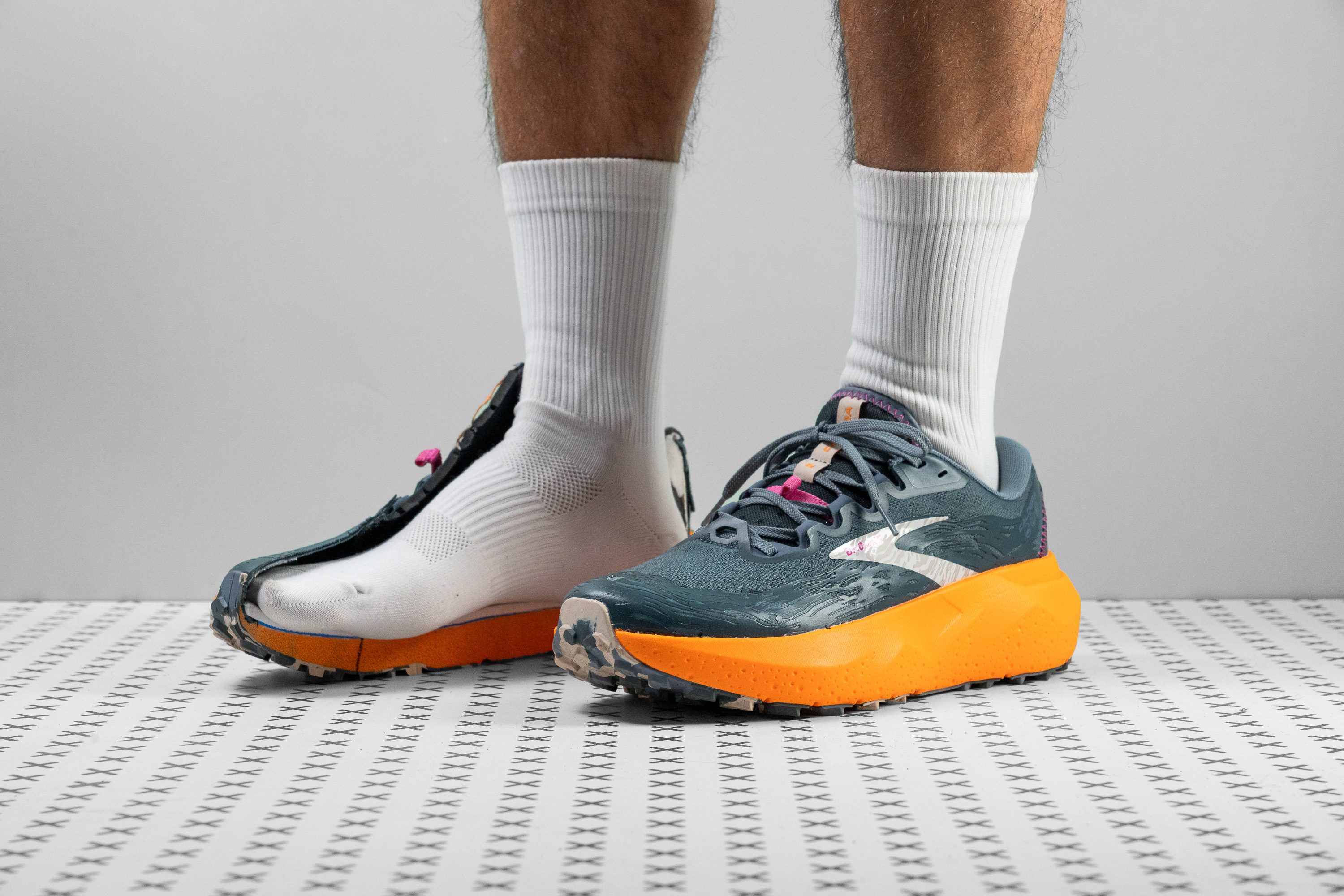Our verdict
- Top pick in best ultra running shoes (2024)
- Top pick in best Brooks trail running shoes (2024)
Pros
- Enhanced, maxed-out protection
- Excellent grip on dry surfaces
- Remarkably stable despite its massive height
- Ideal for heel strikers
- Perfect for road-to-trail transitions
- Ultra-comfortable for long runs with DNA Loft v3
- Lighter compared to the Caldera 5
- Superb heel support
- Extensive upper TPU protection
Cons
- Still too heavy
- Excessively wide platform for technical terrain
- Too much exposed foam on the outsole
Audience verdict
- Top 30% in trail running shoes
Comparison
The most similar running shoes compared
+ + Add a shoe | |||||
|---|---|---|---|---|---|
| Audience score | 88 Great! | 81 Good! | 89 Great! | 85 Good! | |
| Price | $150 | $85 | $150 | $170 | |
| Trail terrain | LightModerate | Light | LightModerate | LightModerate | |
| Shock absorption | - | Moderate | Moderate | Moderate | |
| Energy return | - | Low | Moderate | Moderate | |
| Traction | - | - | High | - | |
| Arch support | Neutral | Neutral | Neutral | Neutral | |
| Weight lab Weight brand | 11.1 oz / 315g 11.1 oz / 314g | 10.3 oz / 292g 10.4 oz / 296g | 10.9 oz / 309g 10.9 oz / 309g | 12.1 oz / 342g 12.9 oz / 365g | |
| Drop lab Drop brand | 12.1 mm 6.0 mm | 10.1 mm 8.0 mm | 8.8 mm 6.0 mm | 7.0 mm 5.0 mm | |
| Strike pattern | Heel | Heel | HeelMid/forefoot | Mid/forefoot | |
| Size | True to size | True to size | True to size | True to size | |
| Midsole softness | Soft | Balanced | Soft | Soft | |
| Difference in midsole softness in cold | Small | Normal | Big | Big | |
| Toebox durability | Very good | Very bad | Bad | Very bad | |
| Heel padding durability | Decent | Bad | Good | Bad | |
| Outsole durability | Good | Decent | Decent | Decent | |
| Breathability | Moderate | Moderate | Moderate | Moderate | |
| Width / fit | Medium | Medium | Medium | Medium | |
| Toebox width | Medium | Medium | Medium | Medium | |
| Stiffness | Stiff | Flexible | Moderate | Stiff | |
| Torsional rigidity | Stiff | Stiff | Stiff | Stiff | |
| Heel counter stiffness | Stiff | Stiff | Stiff | Stiff | |
| Lug depth | 3.5 mm | 4.0 mm | 3.6 mm | 3.0 mm | |
| Heel stack lab Heel stack brand | 38.4 mm 36.0 mm | 37.7 mm 36.0 mm | 36.7 mm 39.0 mm | 40.0 mm 42.0 mm | |
| Forefoot lab Forefoot brand | 26.3 mm 30.0 mm | 27.6 mm 28.0 mm | 27.9 mm 33.0 mm | 33.0 mm 37.0 mm | |
| Widths available | Normal | Normal | Normal | Normal | |
| For heavy runners | ✗ | ✓ | ✗ | ✗ | |
| Season | All seasons | All seasons | All seasons | All seasons | |
| Removable insole | ✓ | ✓ | ✓ | ✓ | |
| Orthotic friendly | ✓ | ✓ | ✓ | ✓ | |
| Ranking | #255 Top 38% | #311 Bottom 18% | #90 Top 24% | #218 Bottom 42% | |
| Popularity | #490 Bottom 27% | #233 Bottom 38% | #160 Top 42% | #106 Top 28% |
Who should buy
The eye-catching Brooks Caldera 6 is an excellent choice for:
- Runners seeking a stable shoe for easy trail adventures with occasional road use.
- Fans of Brooks' running shoes who are venturing into trail running, especially for long endurance sessions.
- Enthusiasts of maximalist shoes looking to explore options beyond brands like Hoka.
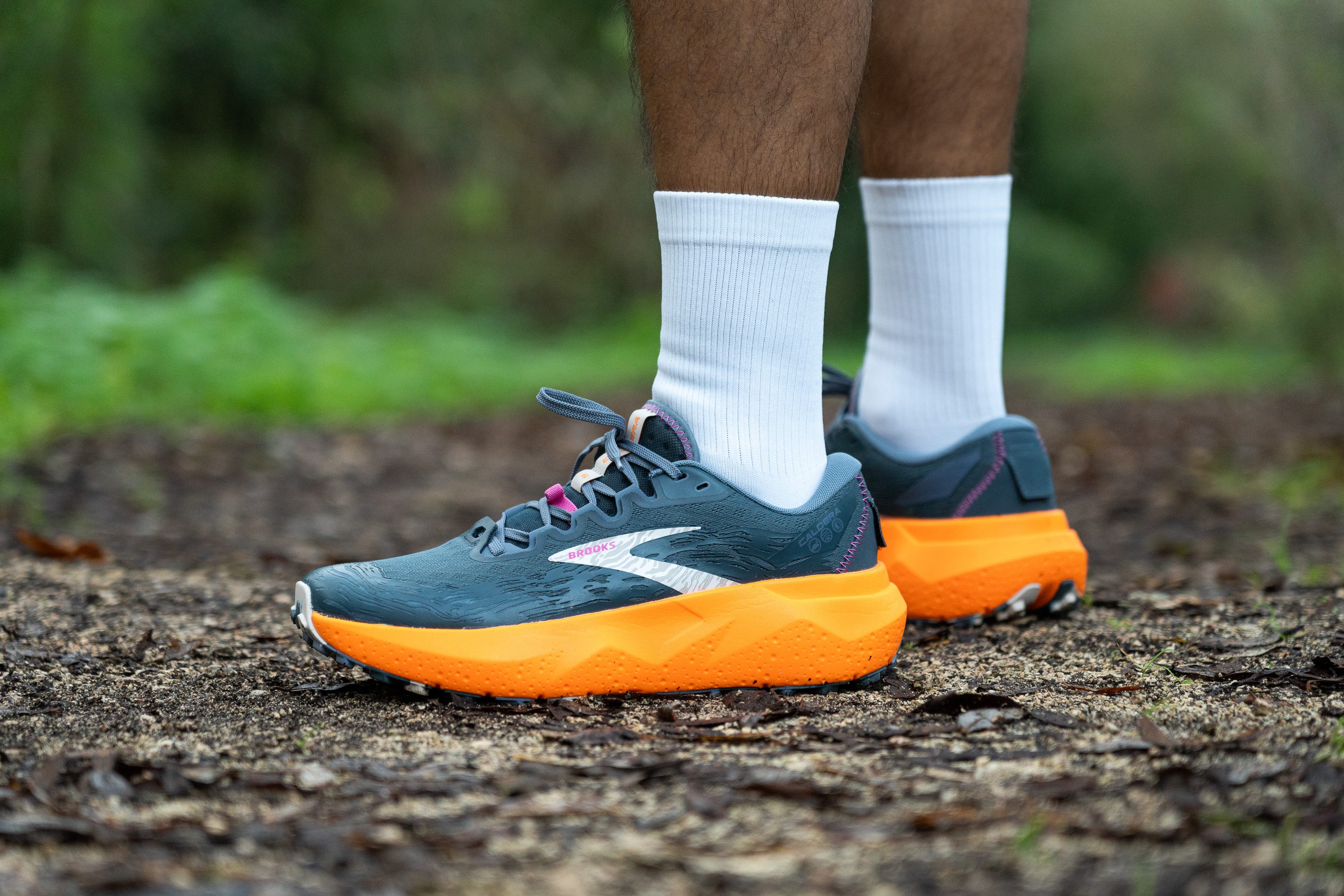
Who should NOT buy
We think that the Brooks Caldera 6 isn't the ideal choice for runners seeking a light and agile mountain running experience. Its weight and size are a bit too much. Instead, consider options like the Saucony Peregrine 13 or the Hoka Speedgoat 5, which offer a more balanced feel.
Additionally, we believe that the Caldera 6 isn't the top option for those tackling technical or muddy trails, as it excels more on easy paths like fire roads or even some road segments. For technical terrains, a shoe like the Hoka Mafate Speed 4 is a better choice, offering a versatile mix with ample cushioning.
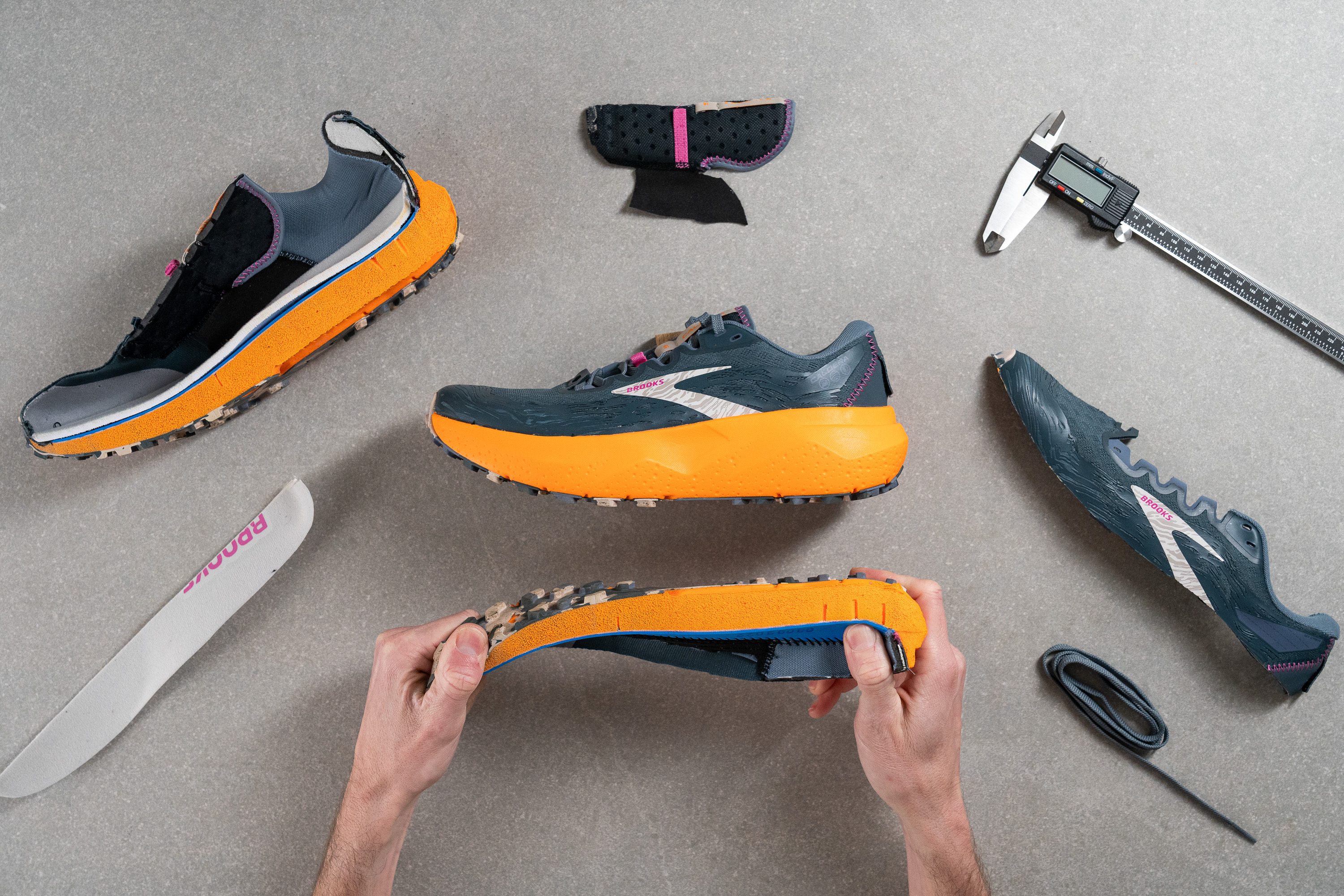
Cushioning
Heel stack
Upon unboxing the shoe in our lab, we were struck by the eye-popping, 38.4-mm stack height and the extreme ratio of midsole to upper. It was truly a sight to behold. However, there was a twist.
Brooks ingeniously designed a bathtub-like shoe to maximize stability. Your feet sit deeply within it to prevent lateral collapse, an the substantial stack height offers a leg-saving experience, particularly for heel strikers.
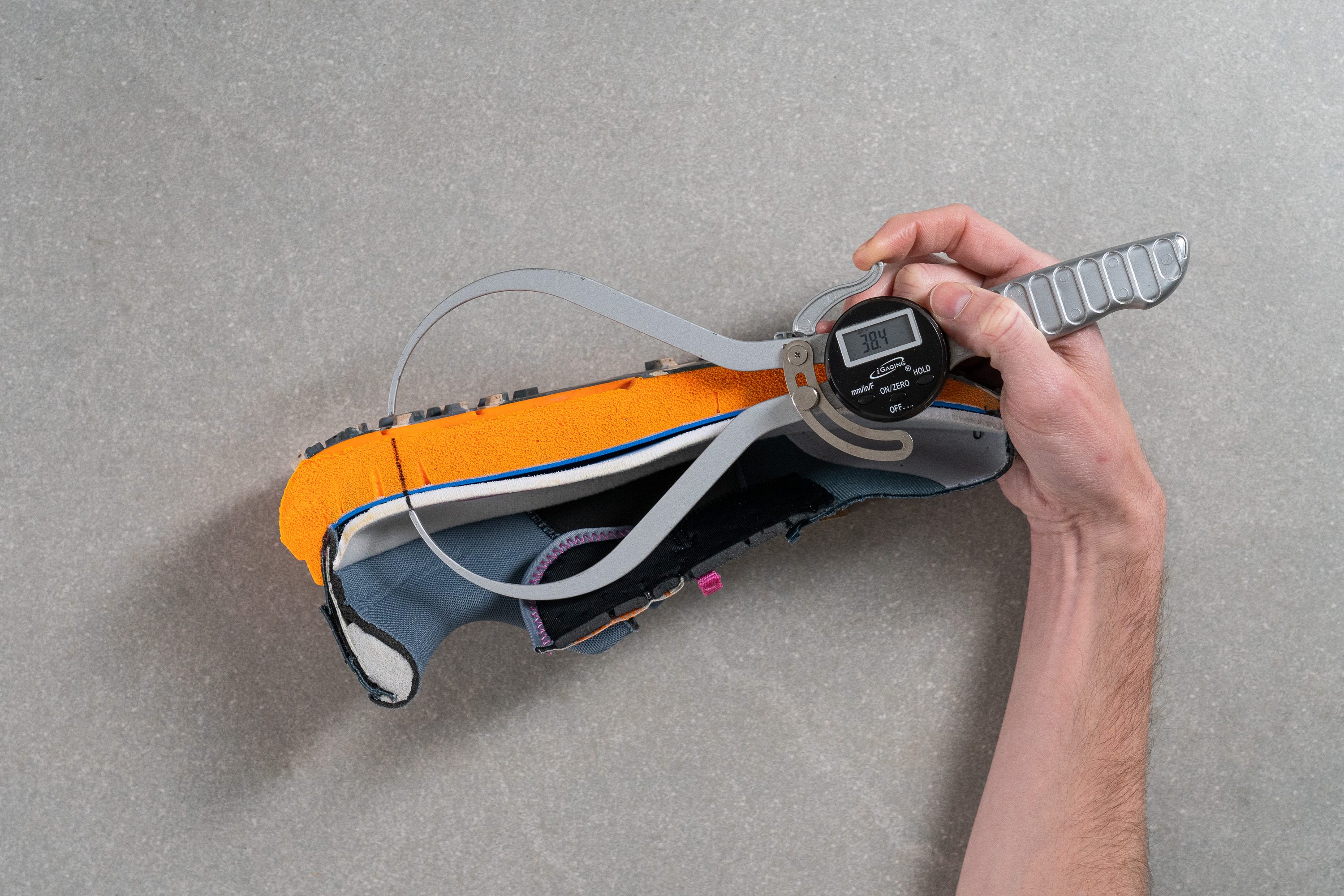
| Caldera 6 | 38.4 mm |
| Average | 32.6 mm |
Forefoot stack
In the forefoot, measured at the World Athletics' standard points—just like the heel—we clocked just 26.3 mm, which, although less than the heel, is still above the average.
This firmly places it in the category of max-cushioned, ultra-trail-ready footwear.
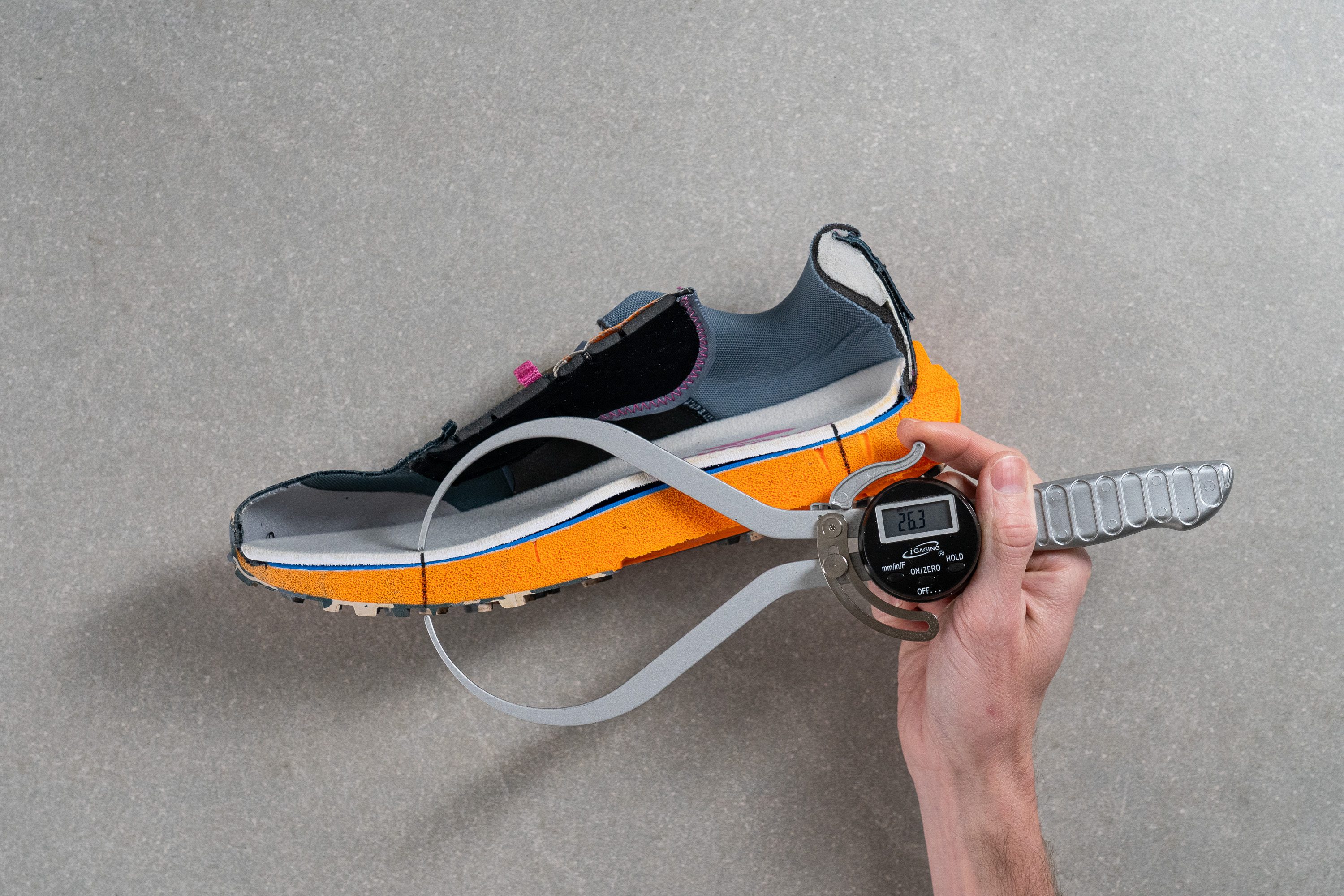
| Caldera 6 | 26.3 mm |
| Average | 25.1 mm |
Drop
The difference between the previous two measurements gives us a 12.1-mm heel-to-toe drop, which is 2x the 6-mm drop the brand claims. Why? We adhere to the WA's guidelines for measuring every shoe in the market, but many brands don't use these standards...
Naturally, with its high drop, the shoe is particularly suitable for heel strikers and those looking to reduce the strain of the long miles on their calves. However, if you want a max-cushioned shoe with less drop, check the Hoka Stinson 7.
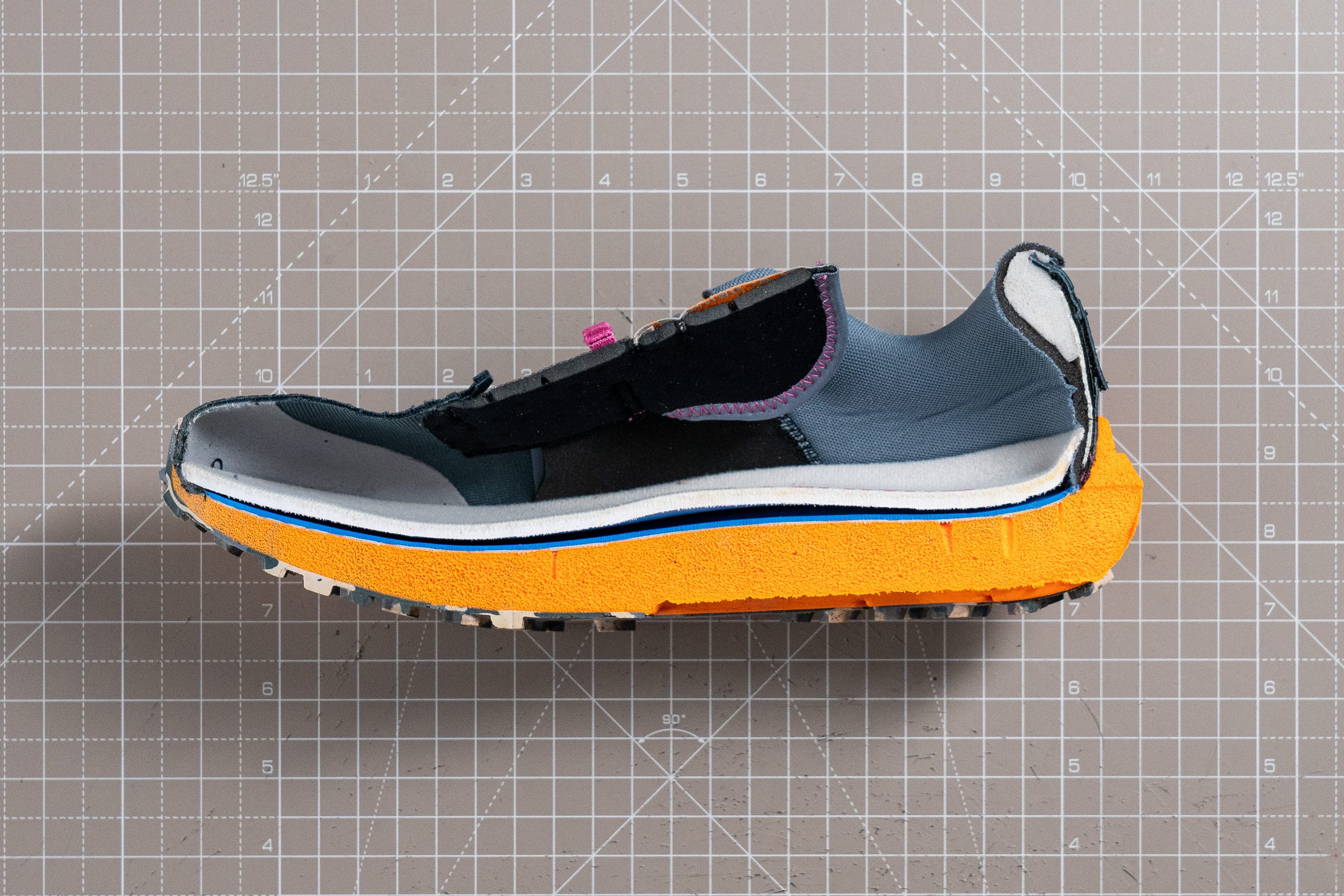
| Caldera 6 | 12.1 mm |
| Average | 7.6 mm |
Midsole softness
Now, let's dive into the midsole, a standout feature of this shoe. Brooks opted for their DNA Loft v3 compound, targeting a soft, plush ride.
This is an EVA-based, Nitrogen-infused foam—since using CO2 would infringe on Skechers' patent—to enhance its lightness and springiness. Our durometer reading of 17.0 HA confirms our impression of a plush ride, and makes the shoe perfect for those set-and-forget long runs in the trails.
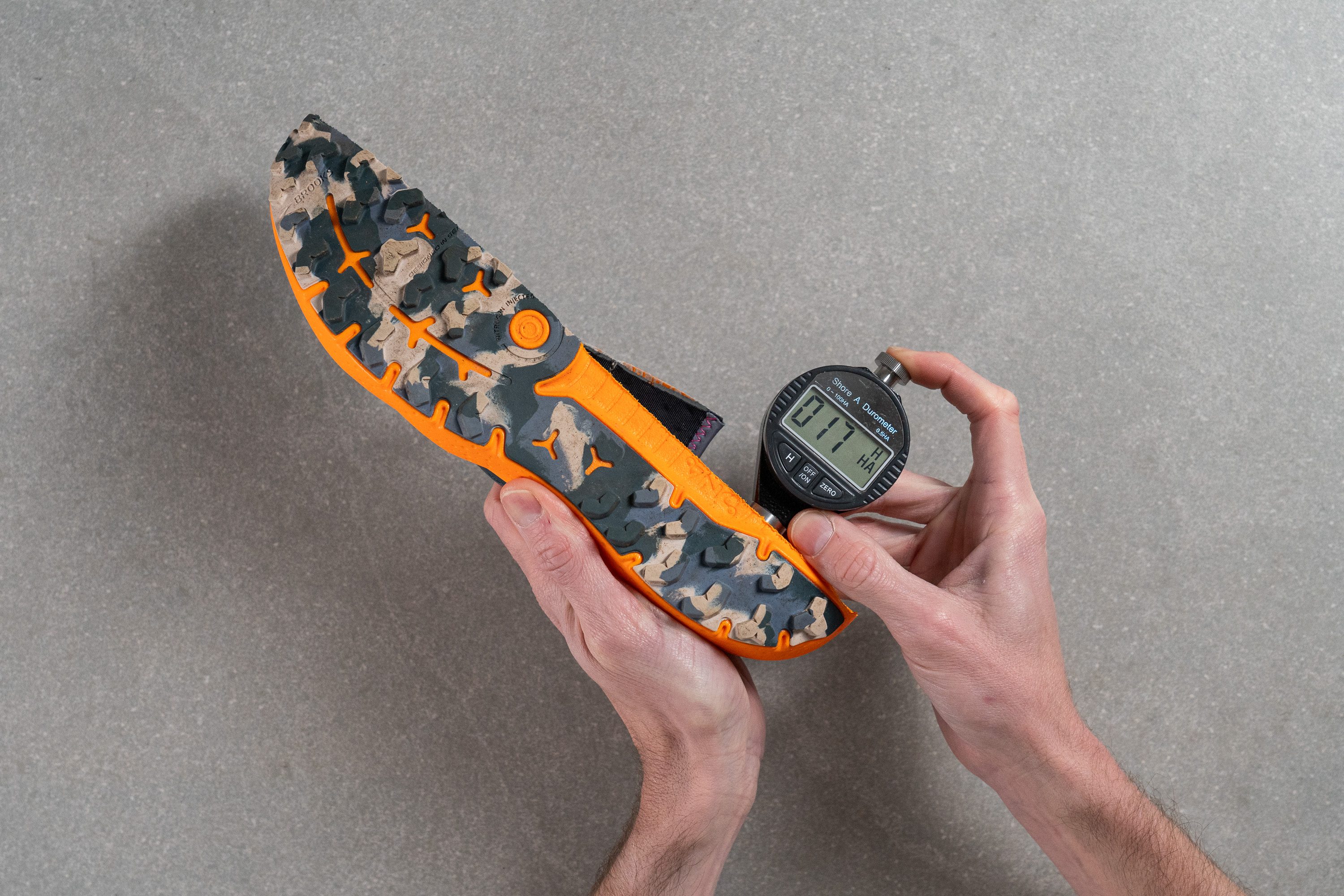
| Caldera 6 | 17.0 HA |
| Average | 22.0 HA |
Size and fit
Size
Brooks Caldera 6 fits true to size (25 votes).
Internal length
| Caldera 6 | 274.1 mm |
| Average | 269.0 mm |
Width / Fit
In our lab tests with the caliper, we found the toebox of the Caldera 6 to be quite average, measuring at 98.5 mm. It should accommodate most runners, except those with extremely narrow or wide feet.
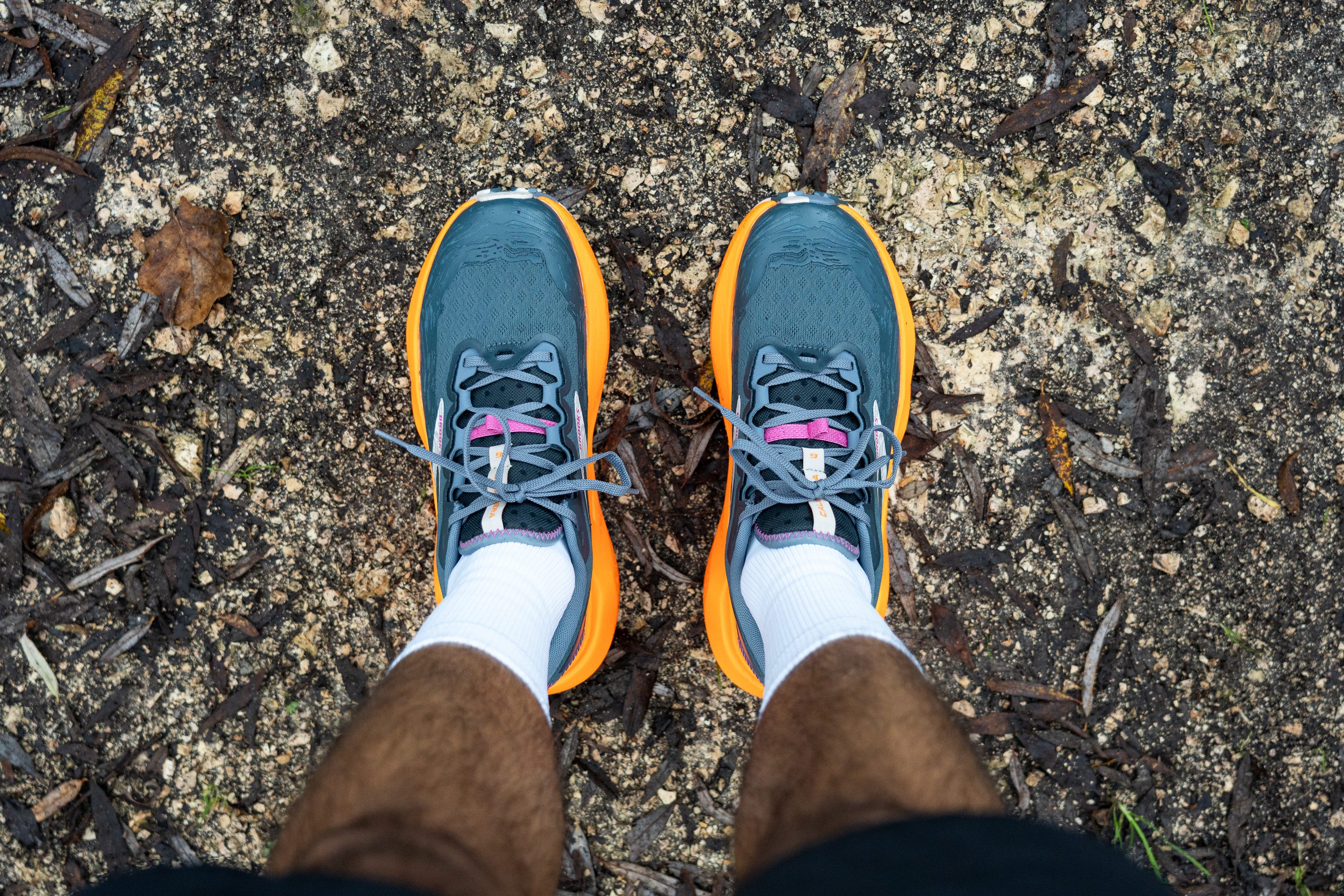
From our tests, we believe the upper will appeal to a broader range of foot shapes and offer more space for longer runs, all while keeping a secure grip for taking corners.
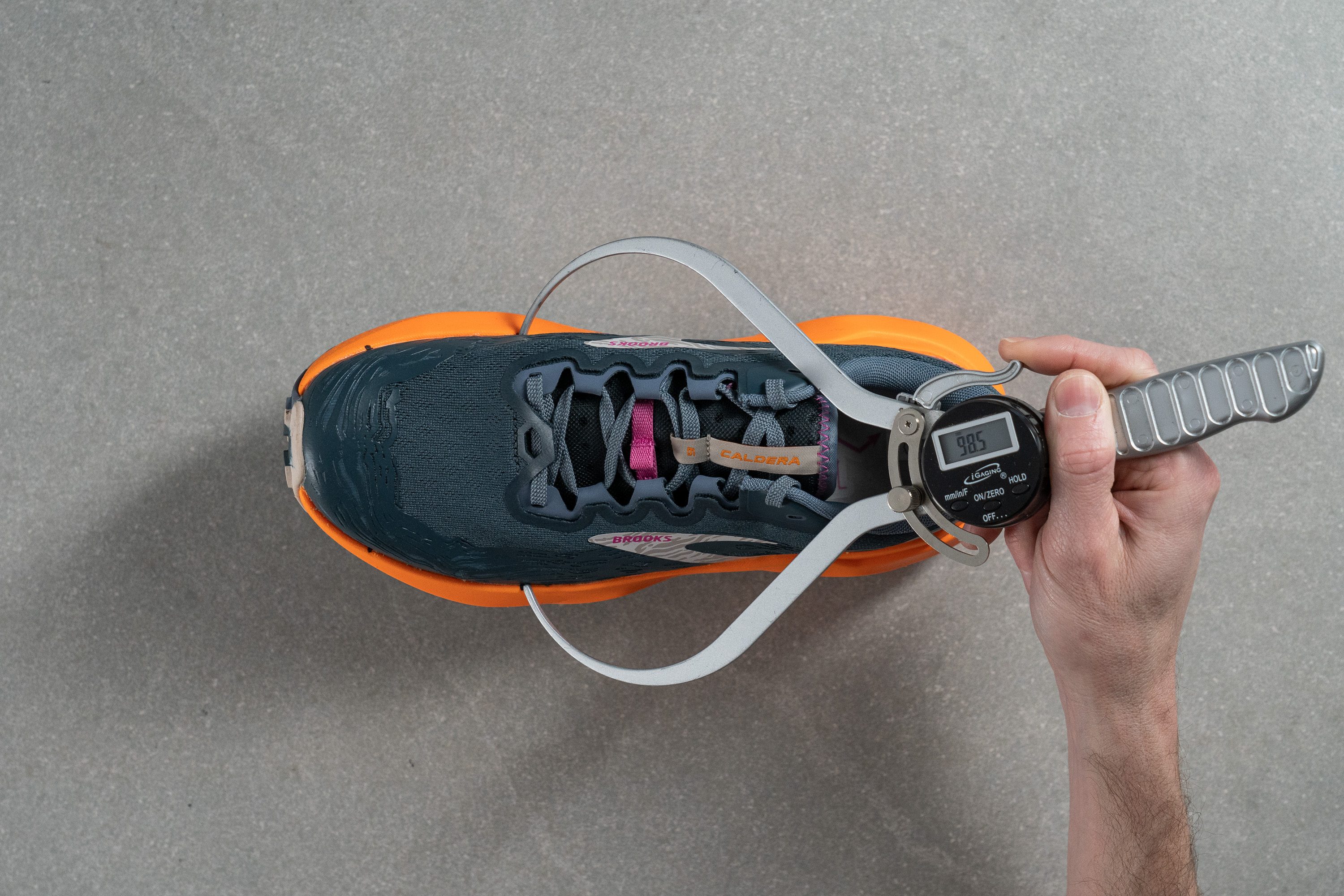
This test follows an older methodology, which is why you don't see recently tested shoes in the chart. Results from different methodologies can not be compared.
| Caldera 6 | 98.5 mm |
| Average | 98.9 mm |
Toebox width
The design in the big toe area is similar, maybe a bit wider, but it's not a drastic difference. Our measurement came in at 78.8 mm.
However, since the toe cap is heavily reinforced with TPU overlays, don't expect much stretchiness. It's best to ensure a comfortable fit from day one, there's no break in period.
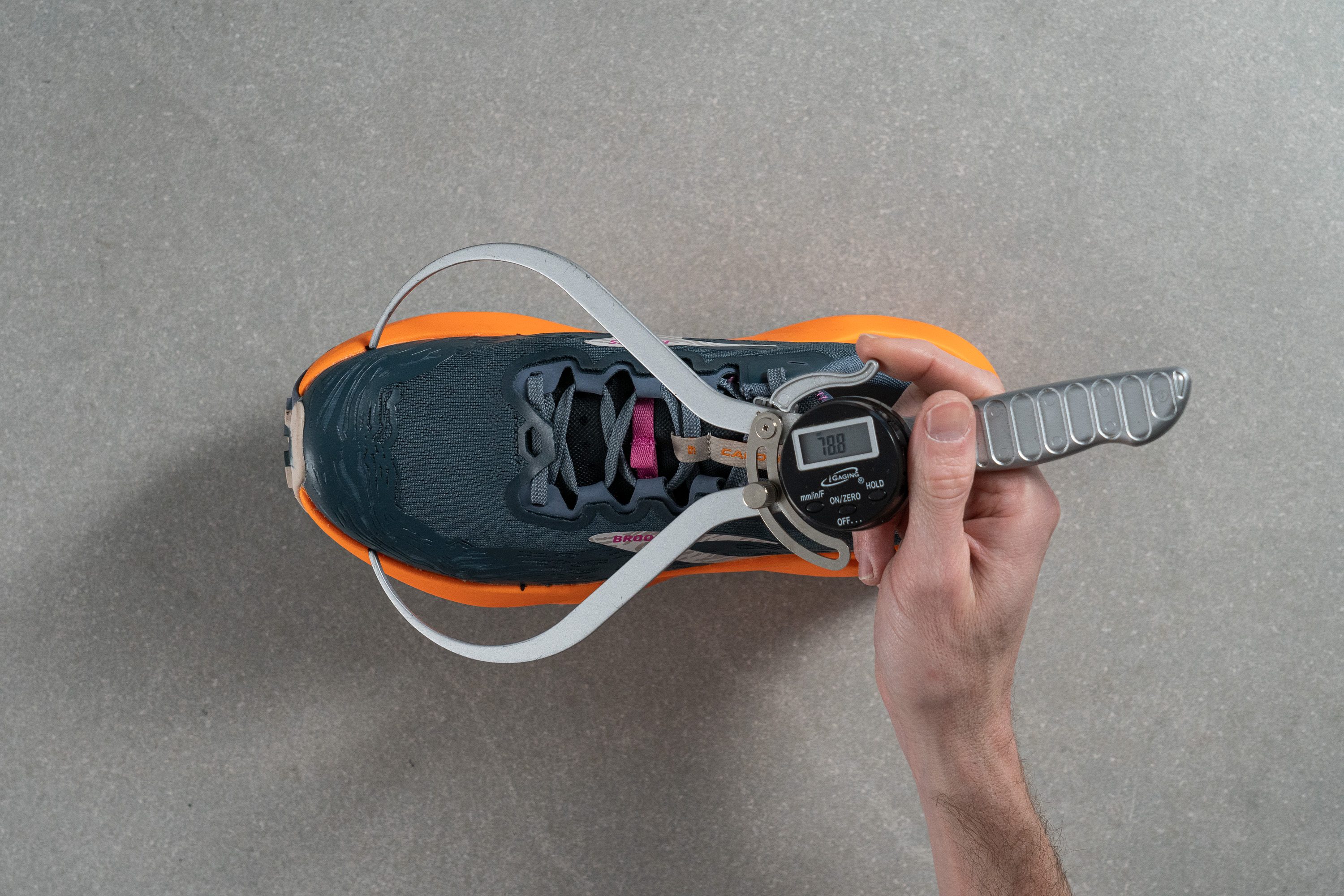
This test follows an older methodology, which is why you don't see recently tested shoes in the chart. Results from different methodologies can not be compared.
| Caldera 6 | 78.8 mm |
| Average | 79.3 mm |
Traction / Grip
Lug depth
Now, let's discuss the lugs. Brooks designed this shoe primarily for the pancake-flat trails of many of the USA's ultramarathons. Consequently, the lugs are relatively short and versatile even for occasional road use, measuring 3.5 mm.
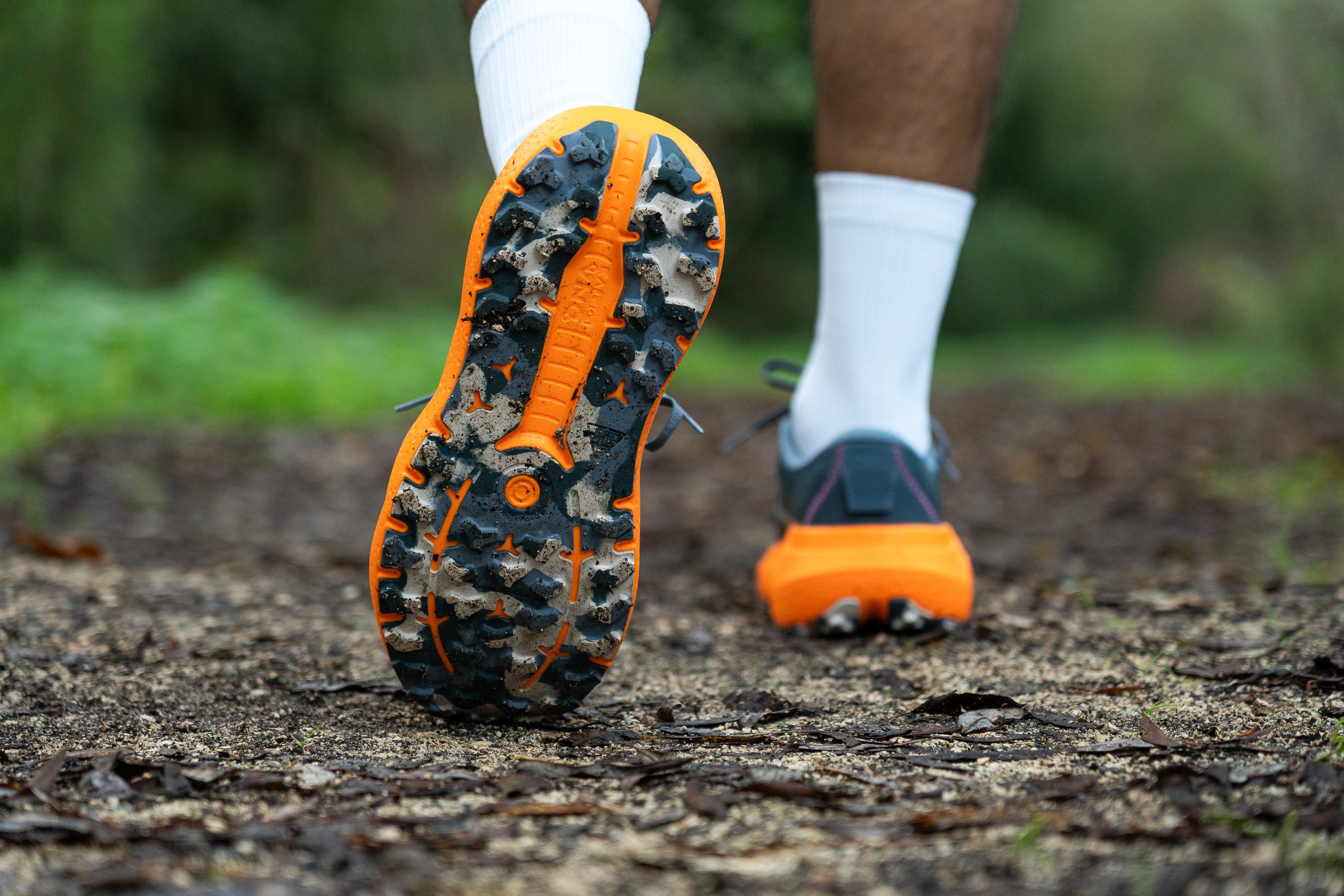
Although Brooks' rugged paint on the lugs makes their shape hard to identify, we examined them closely. All the lugs are chevron-shaped and vary in direction to aid traction on rolling hills.
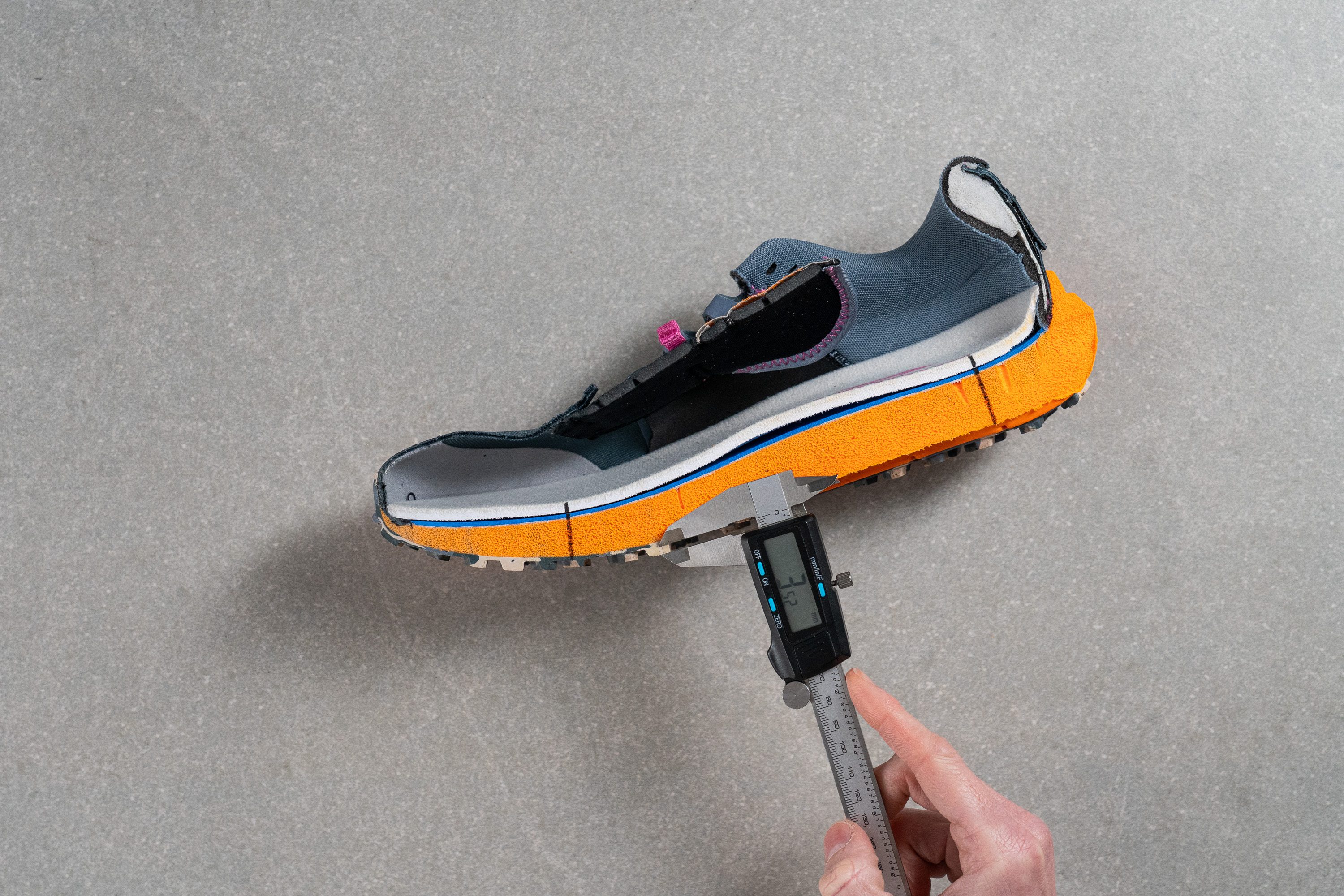
| Caldera 6 | 3.5 mm |
| Average | 3.5 mm |
Flexibility / Stiffness
Returning to our stiffness tests, we next concentrated on the longitudinal aspect. This involves a 90-degree bend test where we measure the force needed to bend the shoe to that angle.
For the Caldera 6, we only needed 26.5N, a very favorable outcome. Why is this good for this particular shoe? Because this Brooks is designed for long-distance runs and even hikes, it shouldn't be too stiff, in order to provide a nice level of comfort.
This test follows an older methodology, which is why you don't see recently tested shoes in the chart. Results from different methodologies can not be compared.
| Caldera 6 | 26.5N |
| Average | 27.1N |
Stiffness in cold
We conducted the 20-minute freezing test again to evaluate the shoe's stiffness in cold winter conditions. Following the test, it required 32.7N of force to bend the shoe, which is nearly the same as the previous result.
| Caldera 6 | 32.7N |
| Average | 35.9N |
Stiffness in cold (%)
In fact, that's just a 23.6% increase, an incredibly small change that we can assure you will be almost imperceptible.
| Caldera 6 | 24% |
| Average | 32% |
Weight
It's particularly important to minimize weight in this shoe because it is quite heavy. Weighing in at 11.1 oz (315g), you should be comfortable with shoes that are on the heavier side.
That said, it doesn’t feel like a tank, performing really well for long distances or at moderate paces. However, don't count on going fast in these or using them for your next skyrace.
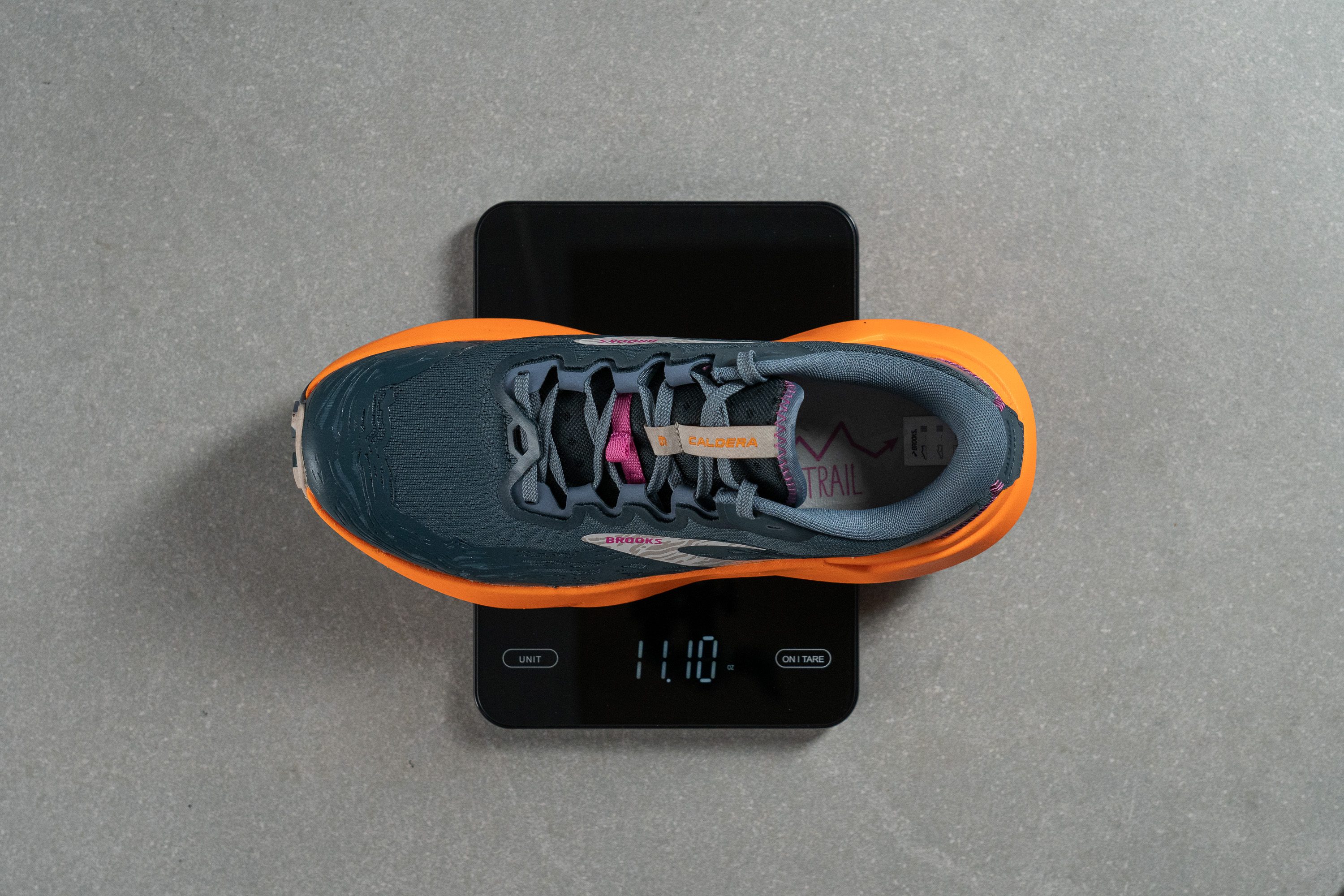
| Caldera 6 | 11.1 oz (315g) |
| Average | 10.2 oz (289g) |
Breathability
Most trail shoes typically feature rugged, durable uppers, but Brooks took a different path with the Caldera 6 to maximize breathability—and they succeeded.
Brooks's strategy involved using a road running upper and adding larger protective elements in strategic places. A prime example is the toe cap; unlike most trail shoes that cover just a small area of the upper, the Caldera 6 covers almost half the toebox.
This design earned the Caldera a 4 out of 5 from us for its airy upper. Without this approach, the shoe might have been too delicate, lacking protective features, or less breathable, with more TPU pieces.
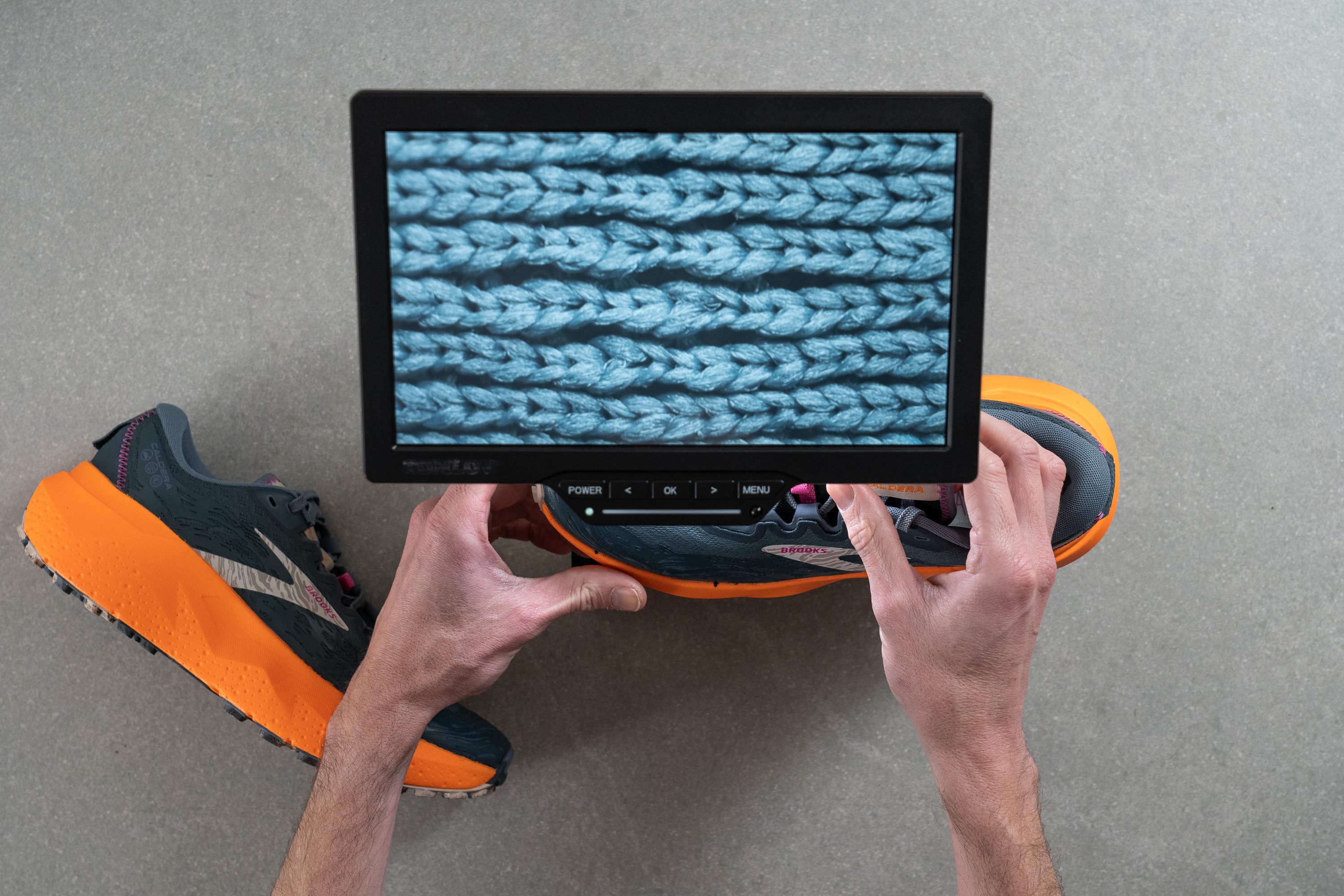
In our lab, under the microscope, we confirmed that the Quick Air Dry upper is similar to those found in road shoes. The mesh threads are widely spaced, allowing for excellent airflow.
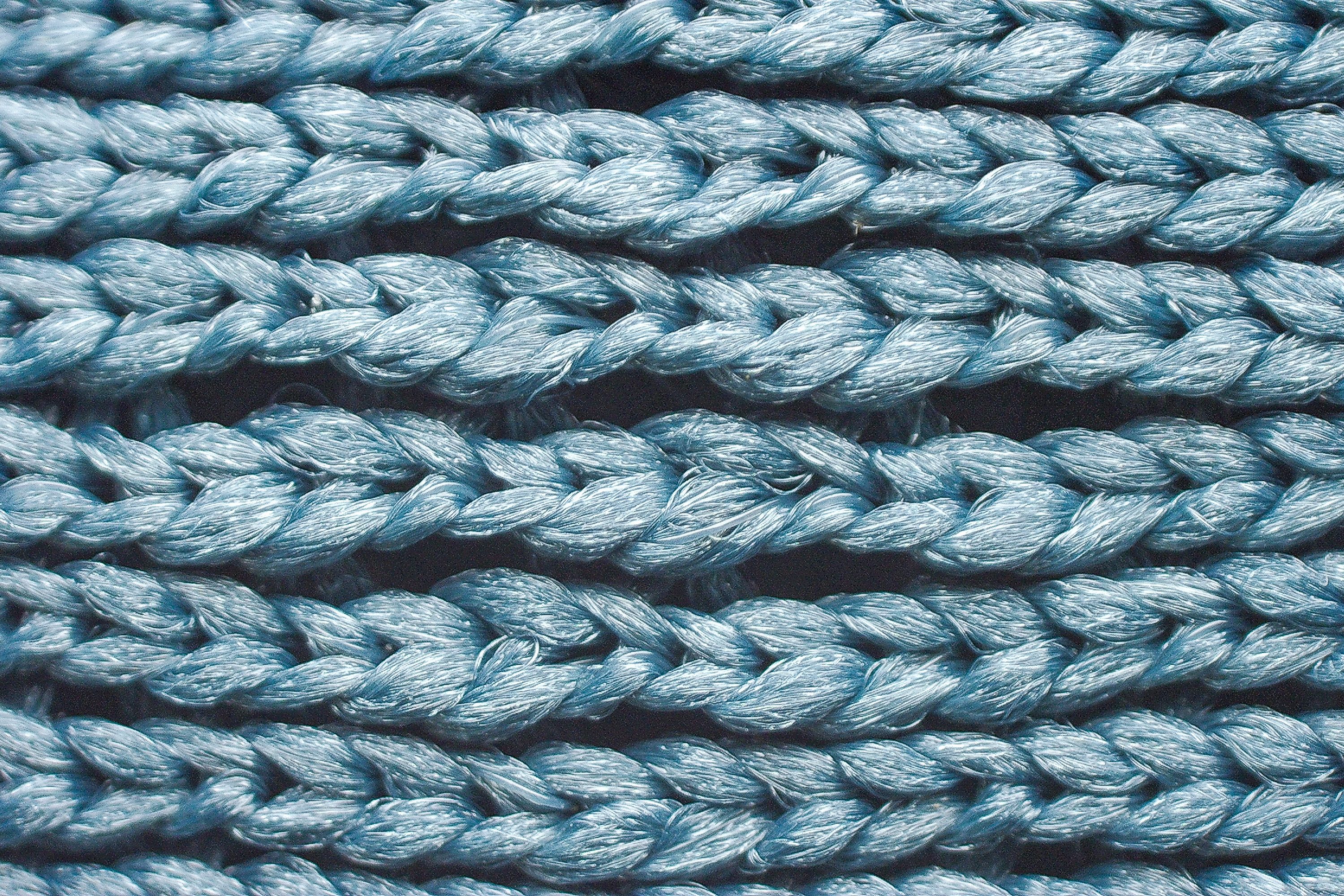
Lastly, our manual assessment of the upper revealed its surprising comfort and padding.
It features multiple layers, even in the toebox, and the toe cap is reinforced inside, which should boost durability.
| Caldera 6 | 4 |
| Average | 3.3 |
Stability
Lateral stability test
In the heel stack measurement, we've already discussed how Brooks achieved decent stability with this shoe—by using massive sidewalls.
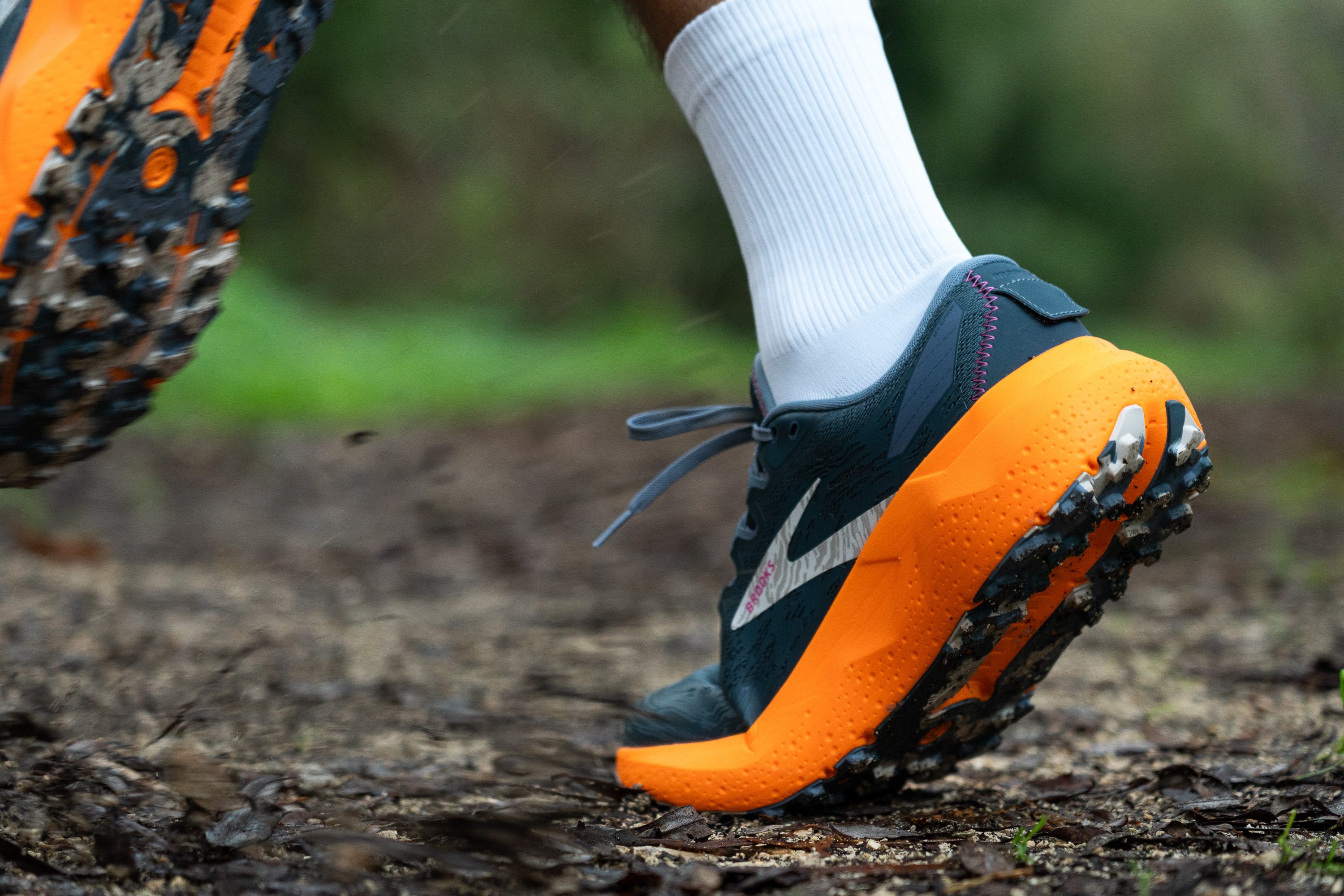
This is evident from the fact that the upper is much lower in height compared to the midsole, indicating that the feet are nestled deep inside the shoe.
Each year, an increasing number of shoes are adopting the sidewall design, like the ASICS Novablast 4. It's not only effective for stability, but it also gives the shoe a really aggressive, muscle-car look.
Torsional rigidity
Despite lacking a rock plate, the Caldera 6 boasts impressive torsional rigidity, scoring 5 out of 5 in our test. This came as a surprise, though the substantial midsole certainly plays a major role in this achievement.
The consequences are straightforward—this design further enhances stability, but the trade-off is reduced agility on technical terrain.
| Caldera 6 | 5 |
| Average | 3.6 |
Heel counter stiffness
The heel counter is also quite stiff, earning a score of 4 out of 5 from us. This makes sense from Brooks' perspective, as we believe they designed the shoe to be stable for long miles and secure for heel strikers.
| Caldera 6 | 4 |
| Average | 3 |
Midsole width - forefoot
Another aspect that immediately grabbed our attention upon unboxing the shoe was its colossal size. We can recall only a few instances where we've encountered a larger shoe.
Keen to determine its exact dimensions, we grabbed our calipers. The forefoot measured a whopping 119.5 mm, placing it among the widest shoes we've ever tested in the lab. This further illustrates Brooks' relentless pursuit of stability in this shoe, despite its cloud-like foam.
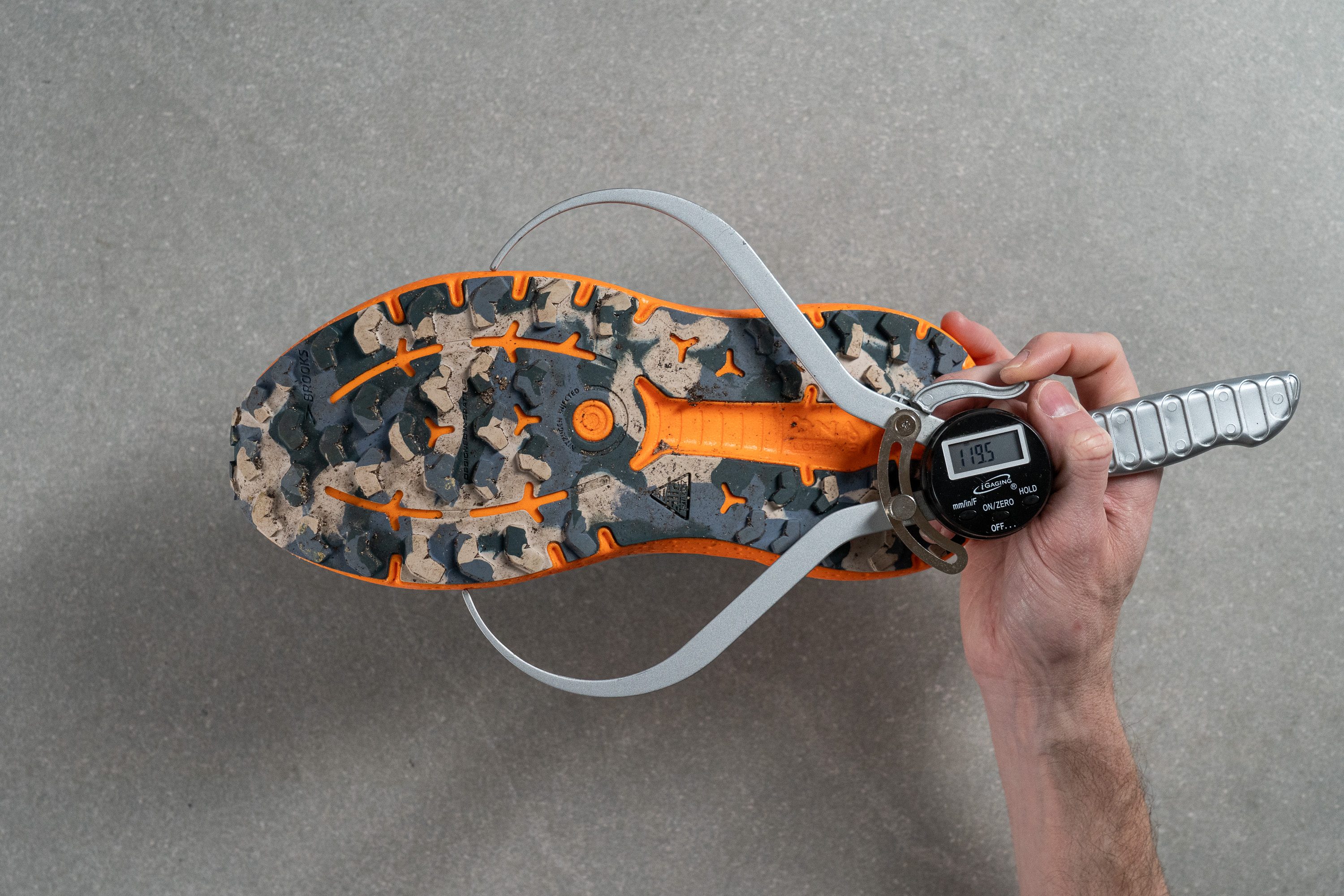
| Caldera 6 | 119.5 mm |
| Average | 112.8 mm |
Midsole width - heel
The heel is even more striking compared to the average shoe, boasting an almost surreal width of 106.0 mm. The shoe not only looks but actually is incredibly wide, making it an excellent choice even for those heel strikers with mild pronation issues.
Naturally, like other trail shoes, the oversized platform of this shoe results in less suitability for technical, twisty terrains.
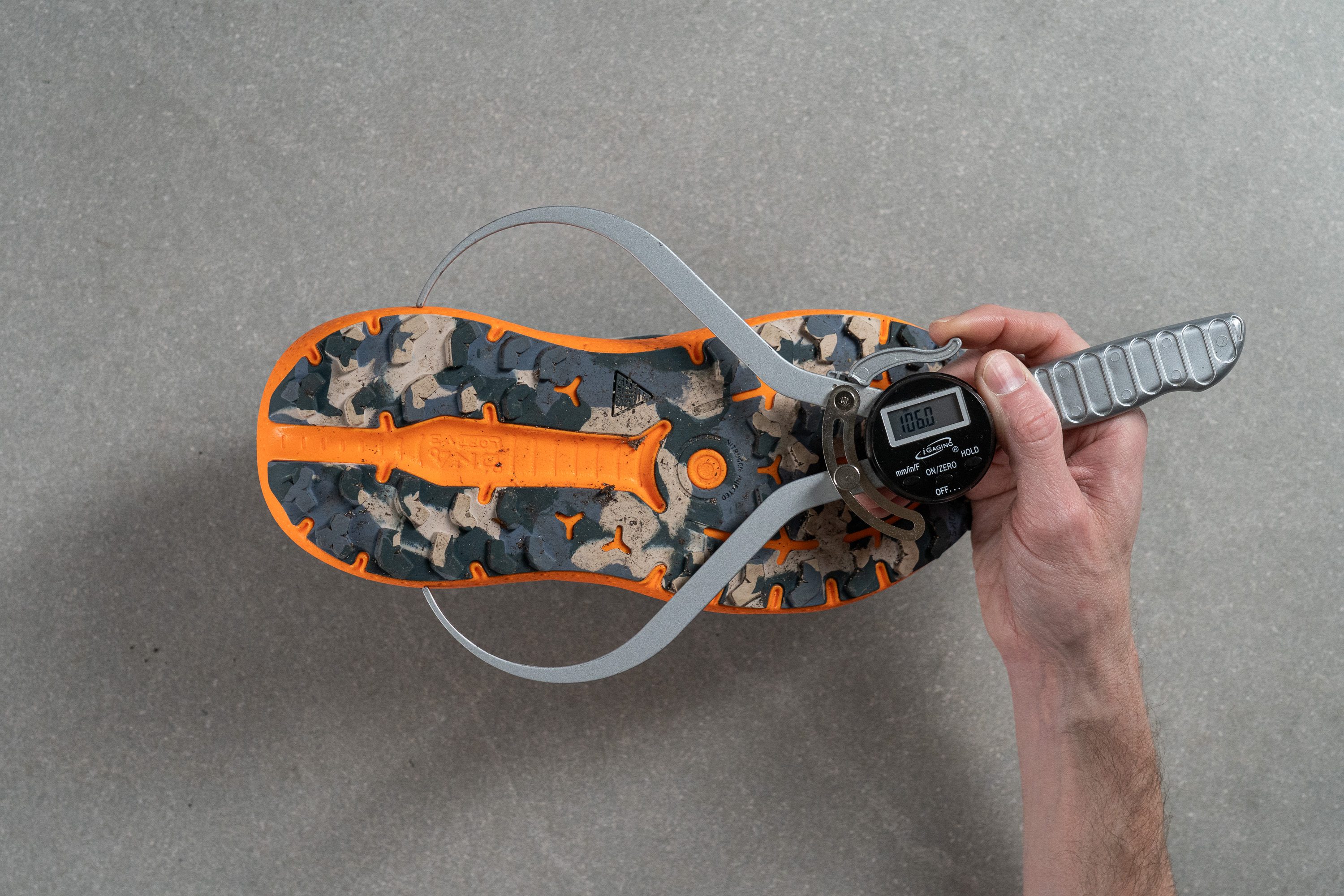
| Caldera 6 | 106.0 mm |
| Average | 89.9 mm |
Durability
Toebox durability
An additional perk of these protective elements is their contribution to enhanced durability. Knit and mesh, the typical materials for uppers, are often susceptible to wear and tear.
However, TPU or TPEE overlays provide outstanding resistance to all kinds of damage, including what we put them through in our Dremel test. That's an impressive and perfect score of 5 out of 5!
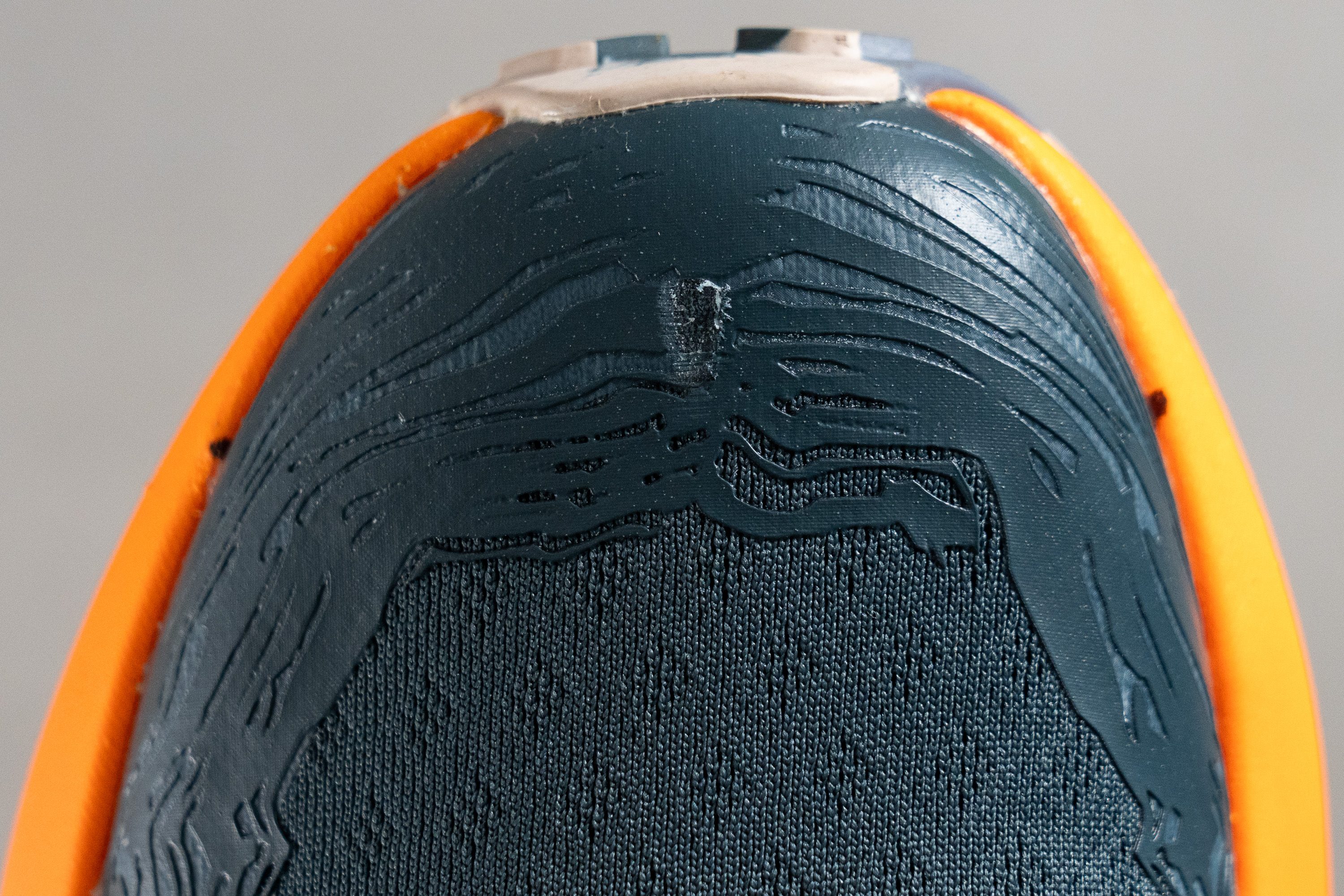
| Caldera 6 | 5 |
| Average | 3.1 |
Heel padding durability
The heel padding test didn't fare as well as the previous one, but it still left us satisfied in the lab.
After analyzing the damage caused by the Dremel, we settled on a 3 out of 5, which is a solid, average score for a trail shoe.
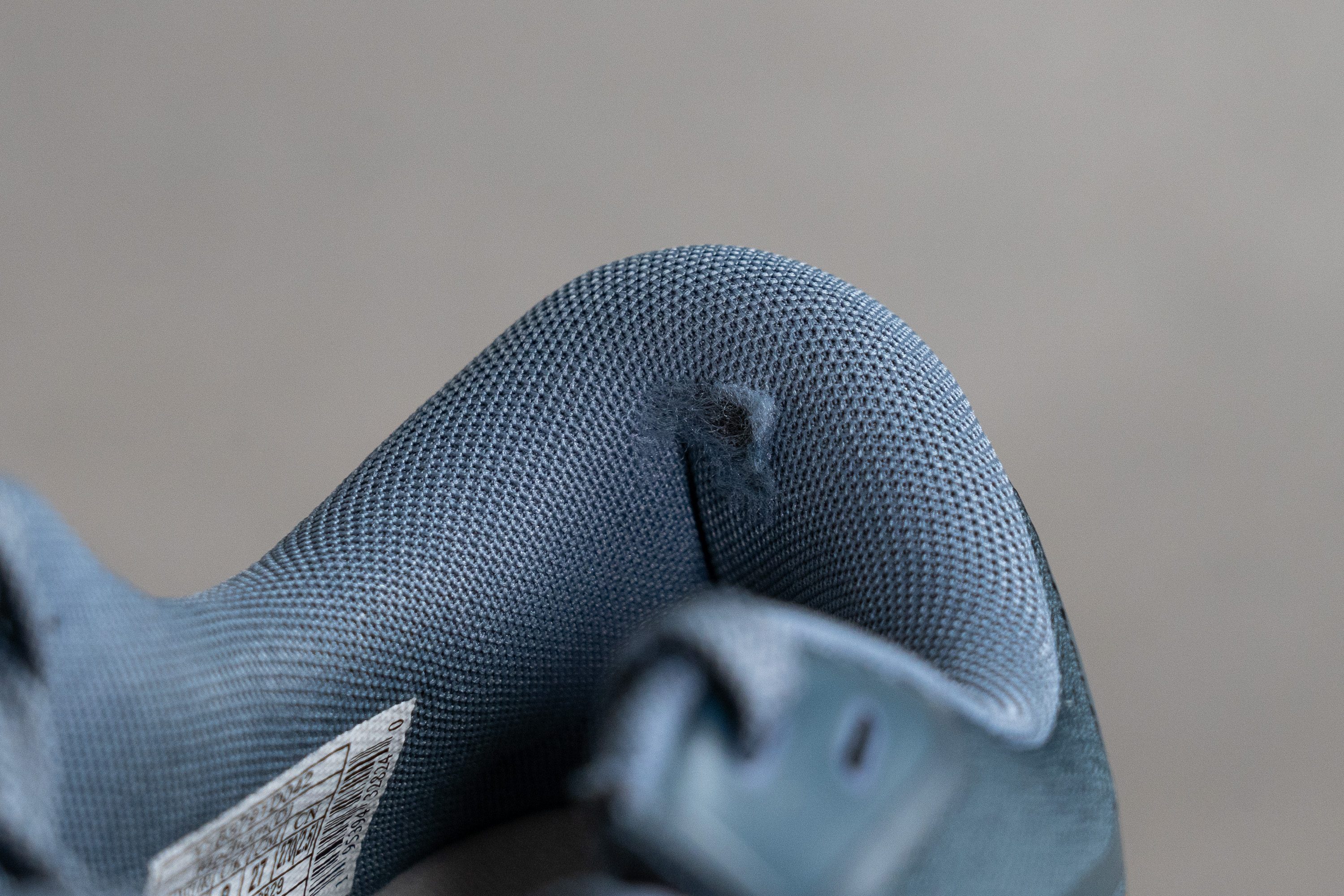
| Caldera 6 | 3 |
| Average | 3 |
Outsole hardness
After evaluating the toebox and heel, it's now time to examine the TrailTrack outsole.
We began by checking its hardness, which measured 83.3 HC on our durometer. This is a tried-and-true approach, aiming for a balance between durability and grip.
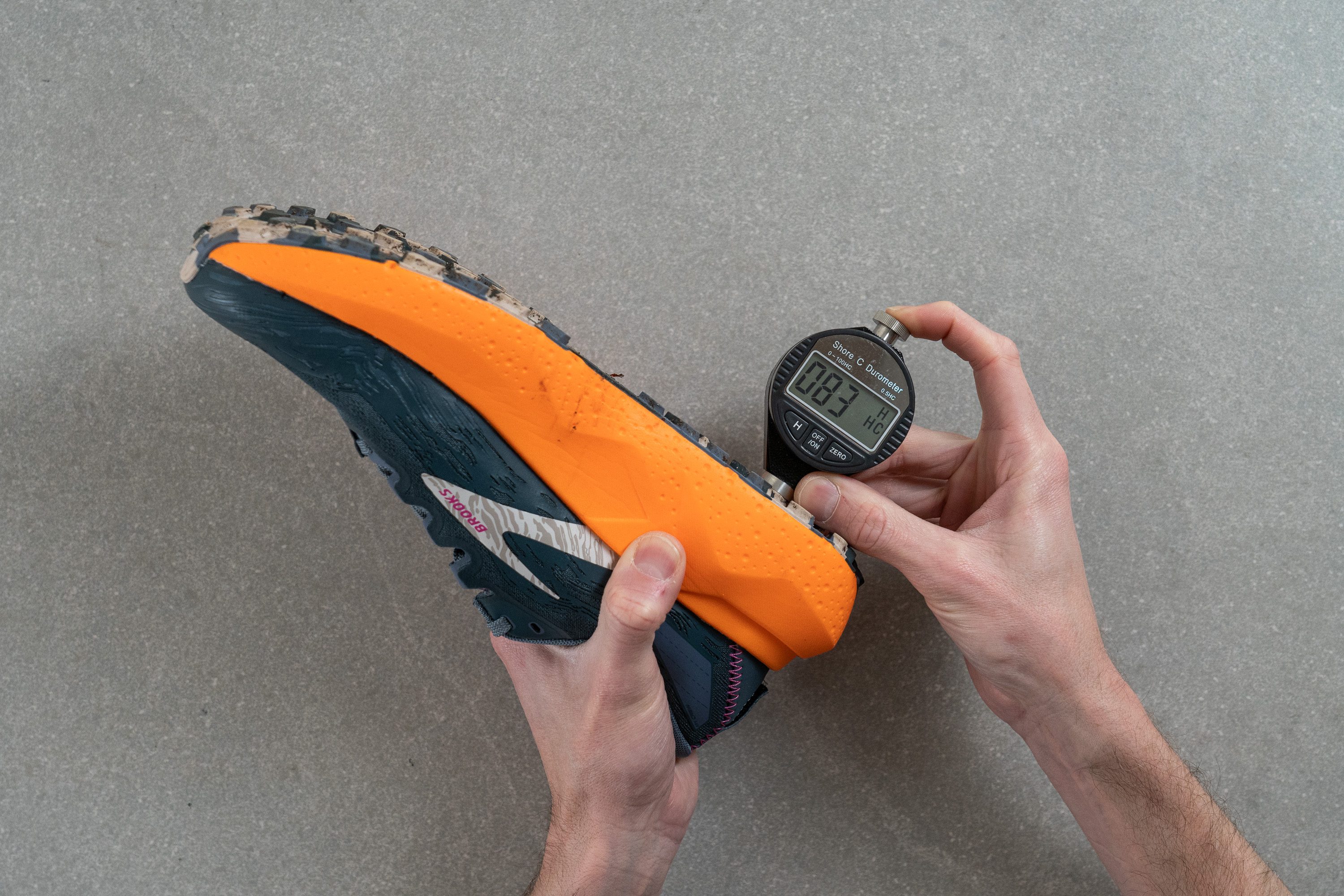
| Caldera 6 | 83.3 HC |
| Average | 85.8 HC |
Outsole durability
Curious to see if the average hardness number would translate to just-okay durability, we fired up the Dremel for the third and last time on the Caldera 6.
We were truly pleased with the results. We observed only a 0.6-mm indentation, which is an excellent outcome, assuring fantastic durability.
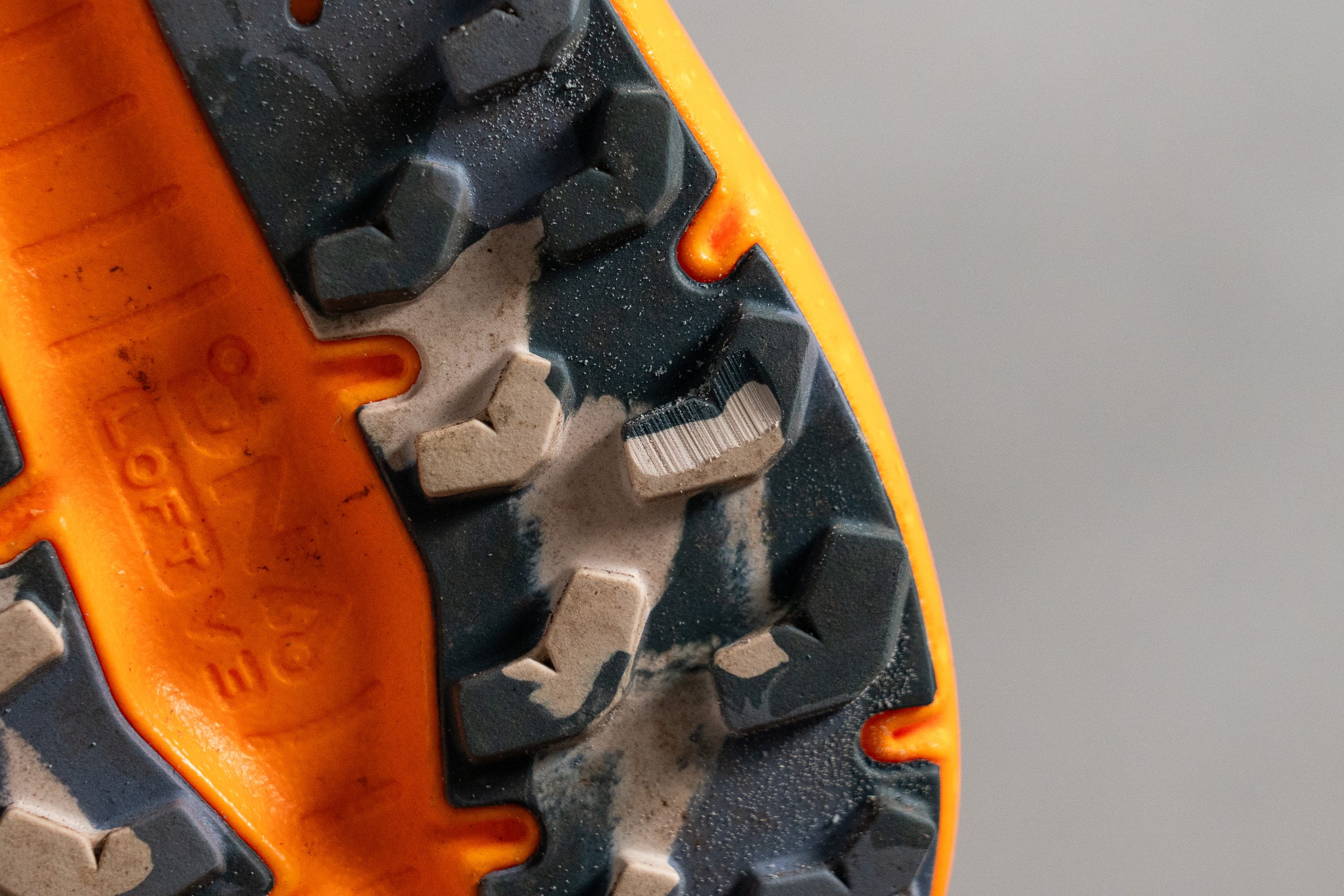
| Caldera 6 | 0.6 mm |
| Average | 0.9 mm |
Outsole thickness
Lastly, we examined the outsole thickness, which measured 1.7 mm. Although it might seem thin, we believe it's the right approach.
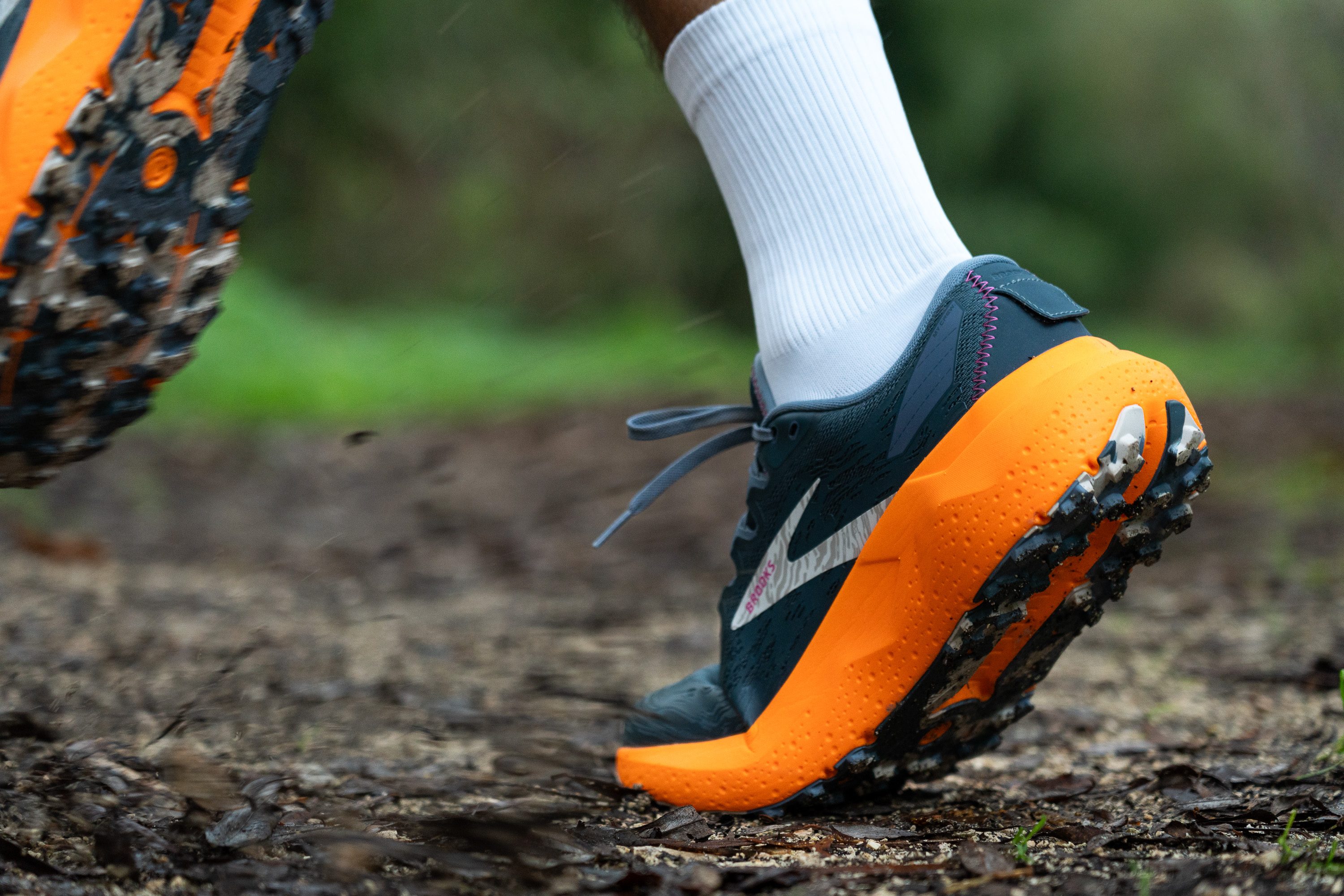
With rubber that has proven its durability and hardness, opting for a thicker outsole would add unnecessary weight and mute the ride, making the shoe feel less lively, especially for those in the hunt for a trail-to-road shoe.
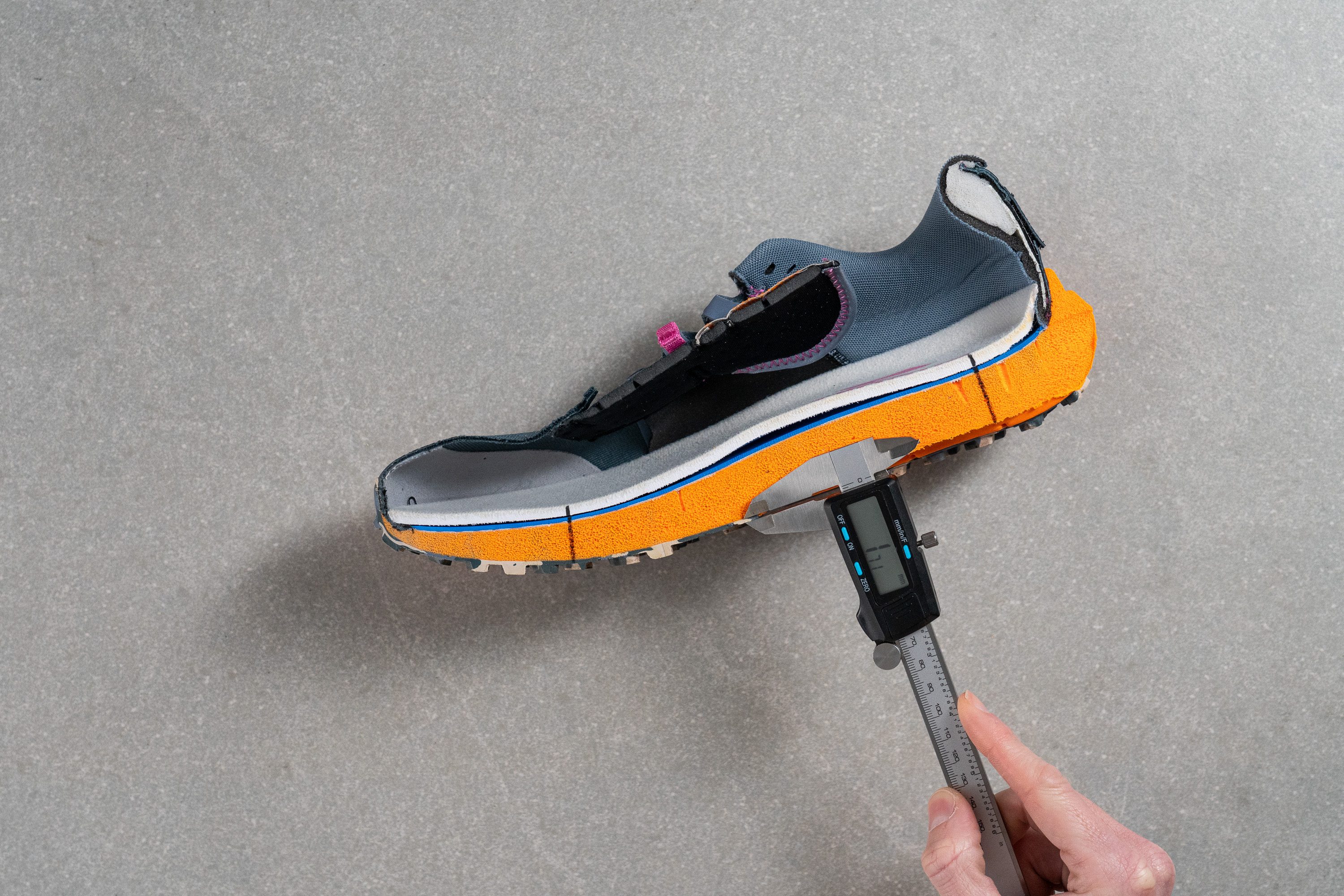
| Caldera 6 | 1.7 mm |
| Average | 2.2 mm |
Misc
Insole thickness
In our lab, we found the insole to be slightly thinner than usual, measuring at 5.0 mm.
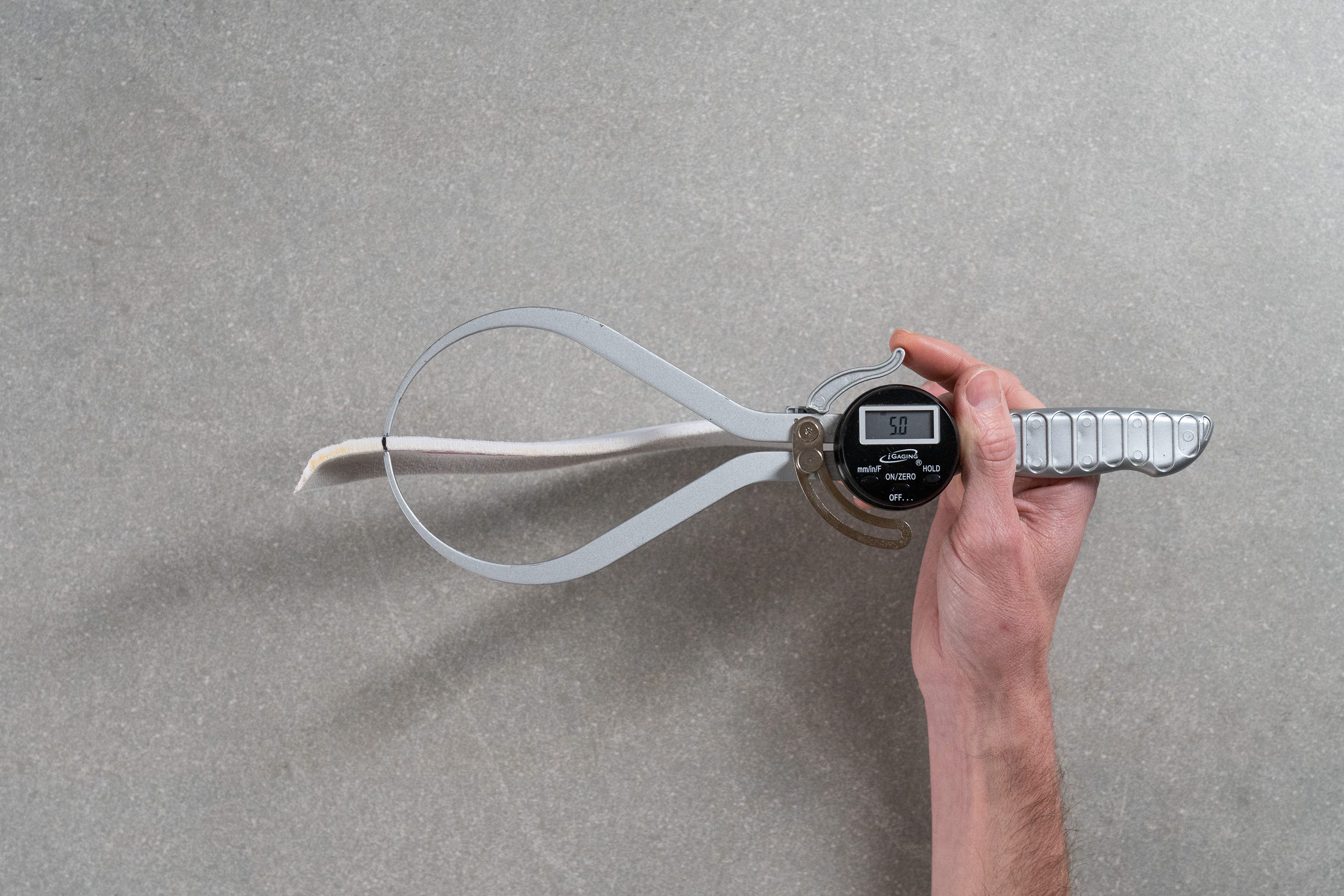
| Caldera 6 | 5.0 mm |
| Average | 4.7 mm |
Removable insole
The insole can be completely removed, making it easy for those who require extra arch support to use custom orthotics.
Also, as shown in our picture, the insole has a slight flare, but it's not substantial. Therefore, we believe most third-party insoles should fit well.
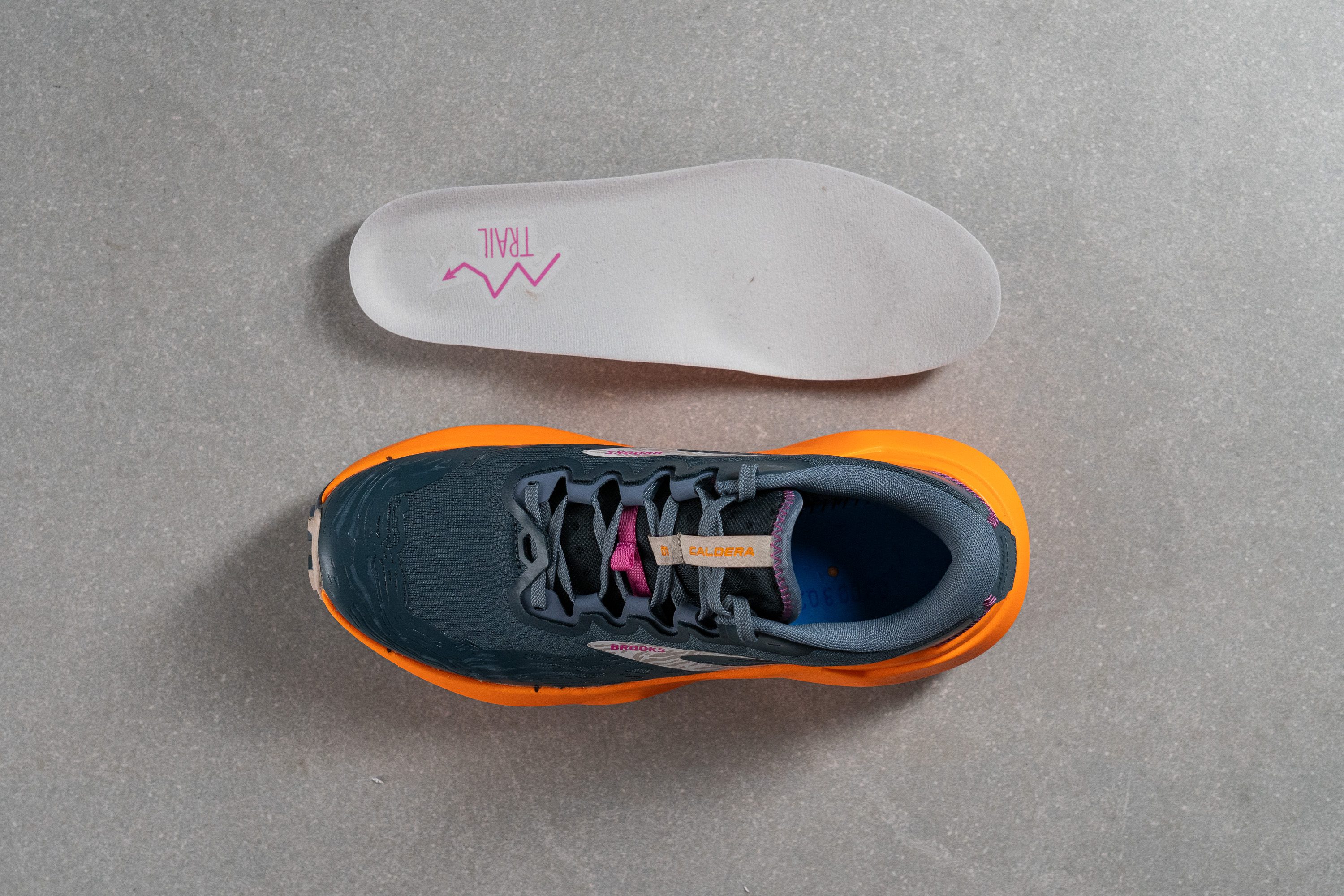
| Caldera 6 | Yes |
Midsole softness in cold
We put the Caldera 6 in the freezer for 20 minutes to see how cold conditions affect its midsole. After cooling down, the midsole registered 19.8 HA on our durometer.
This reading shows that even in cold conditions, the Brooks Caldera 6, with its Nitrogen-infused midsole, stays significantly softer than the average trail shoe at room temperature.
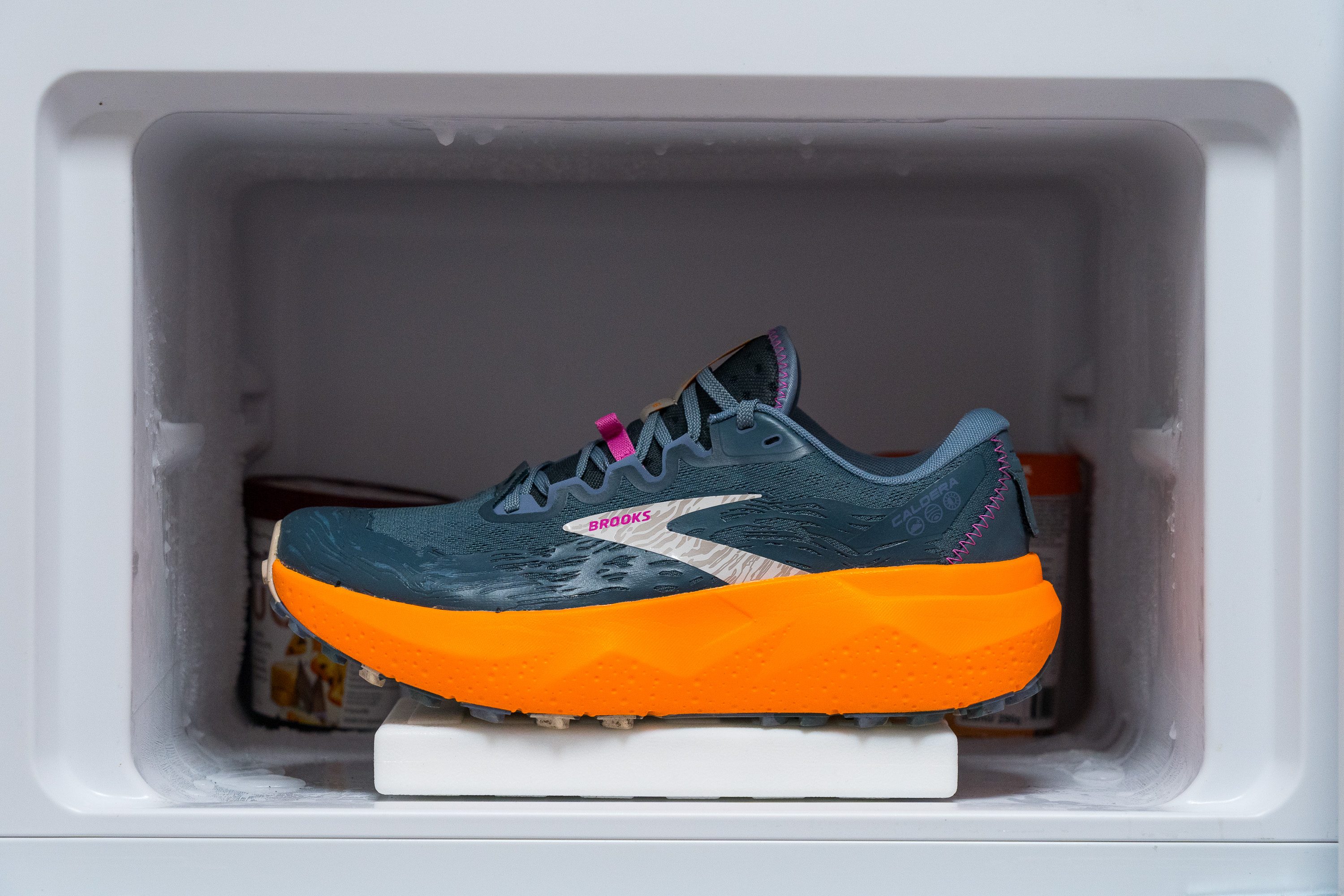
| Caldera 6 | 19.8 HA |
| Average | 27.4 HA |
Midsole softness in cold (%)
The difference between the two measurements is just 16.2%, an impressive performance that guarantees you won't experience any significant changes when running in winter conditions.
| Caldera 6 | 16% |
| Average | 26% |
Reflective elements
The Caldera 6 lacks reflective features, so you should be cautious and wear high-visibility gear when running near roads at night with these.
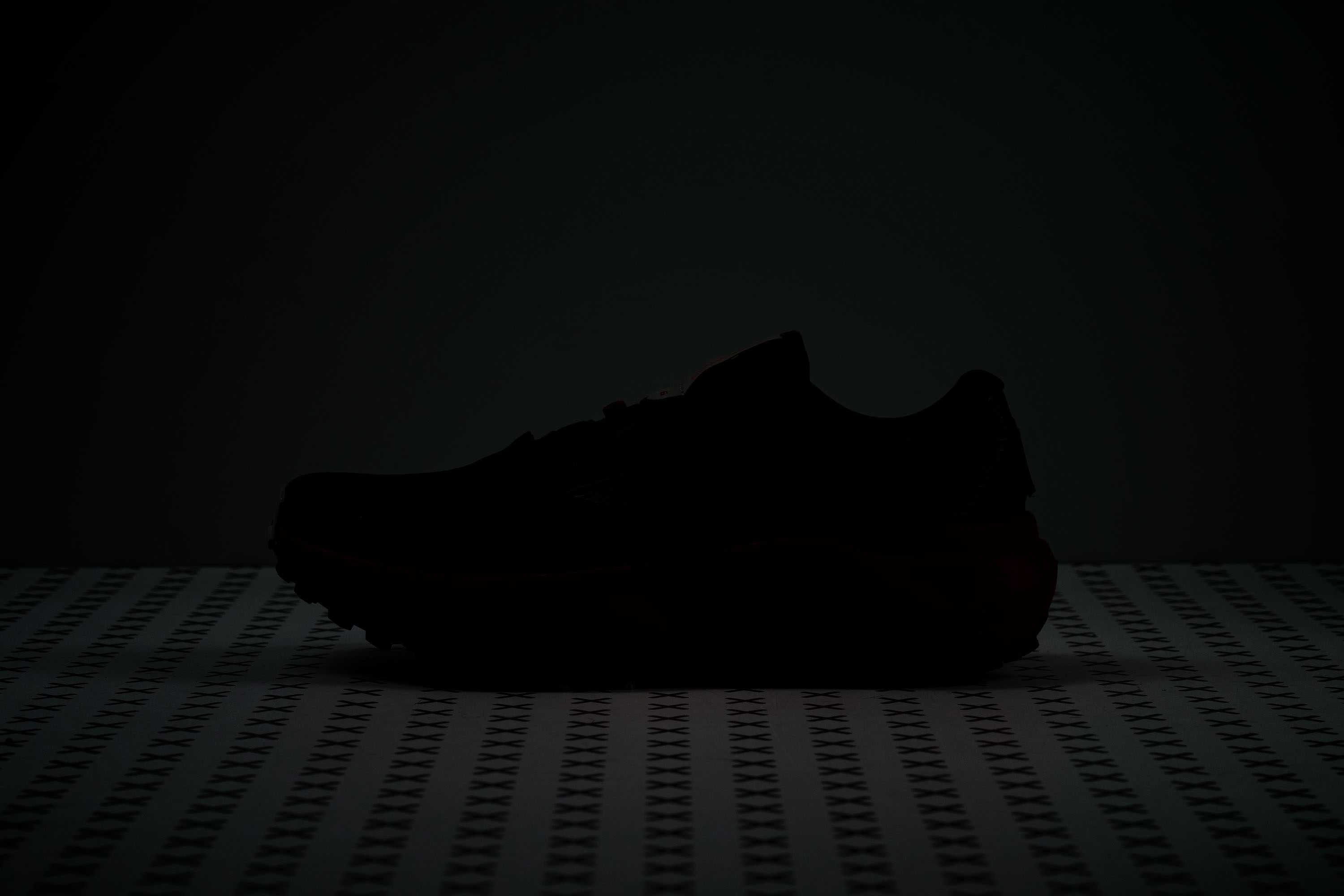
| Caldera 6 | No |
Tongue padding
The tongue has a thickness of 6.0 mm, which is average padding.
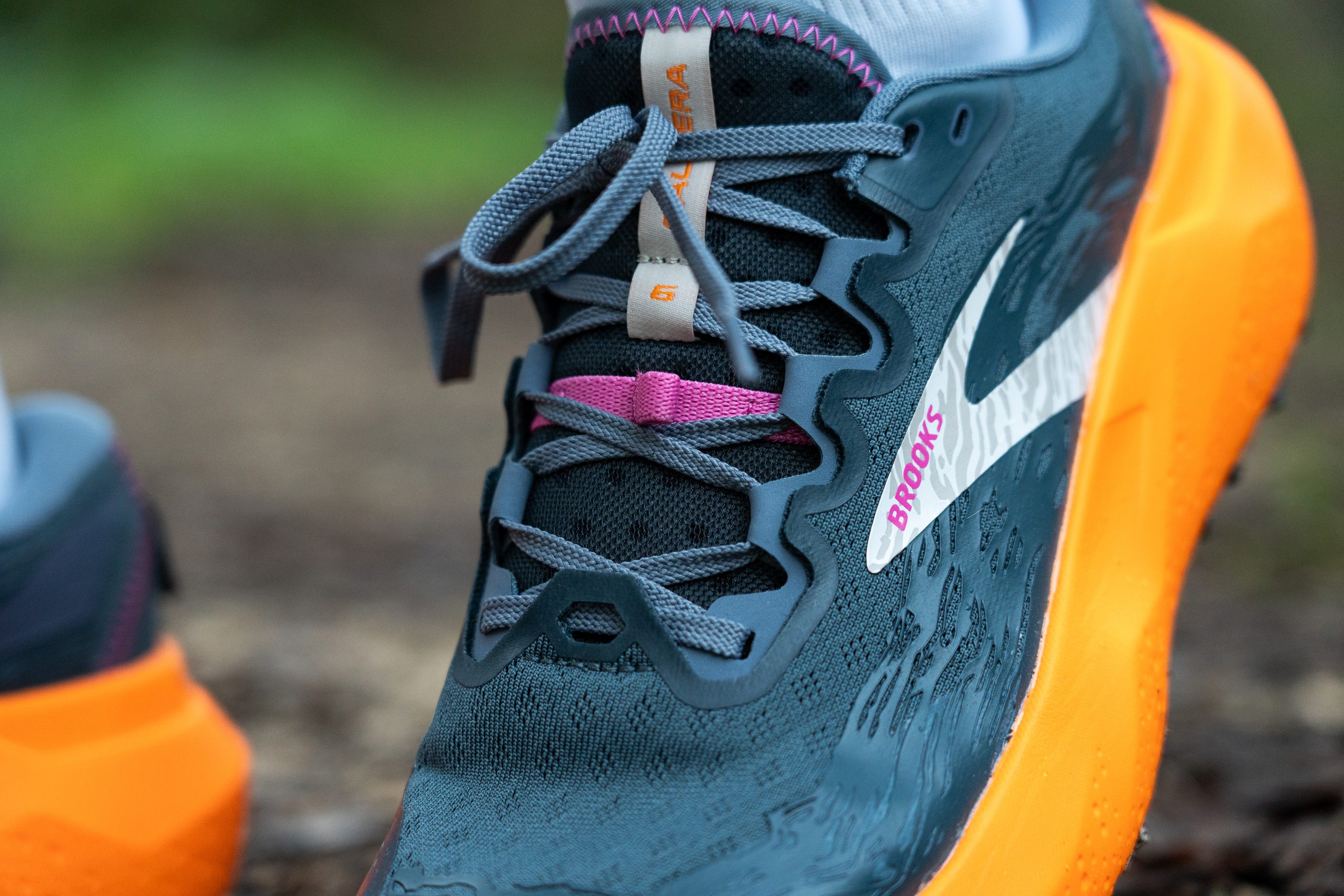
Normally, we'd be happy with this, but in a heavier shoe, opting for a 3-to-4-mm thickness can be a good choice—it's still comfortable and helps reduce the shoe's weight. Perhaps for version 7?
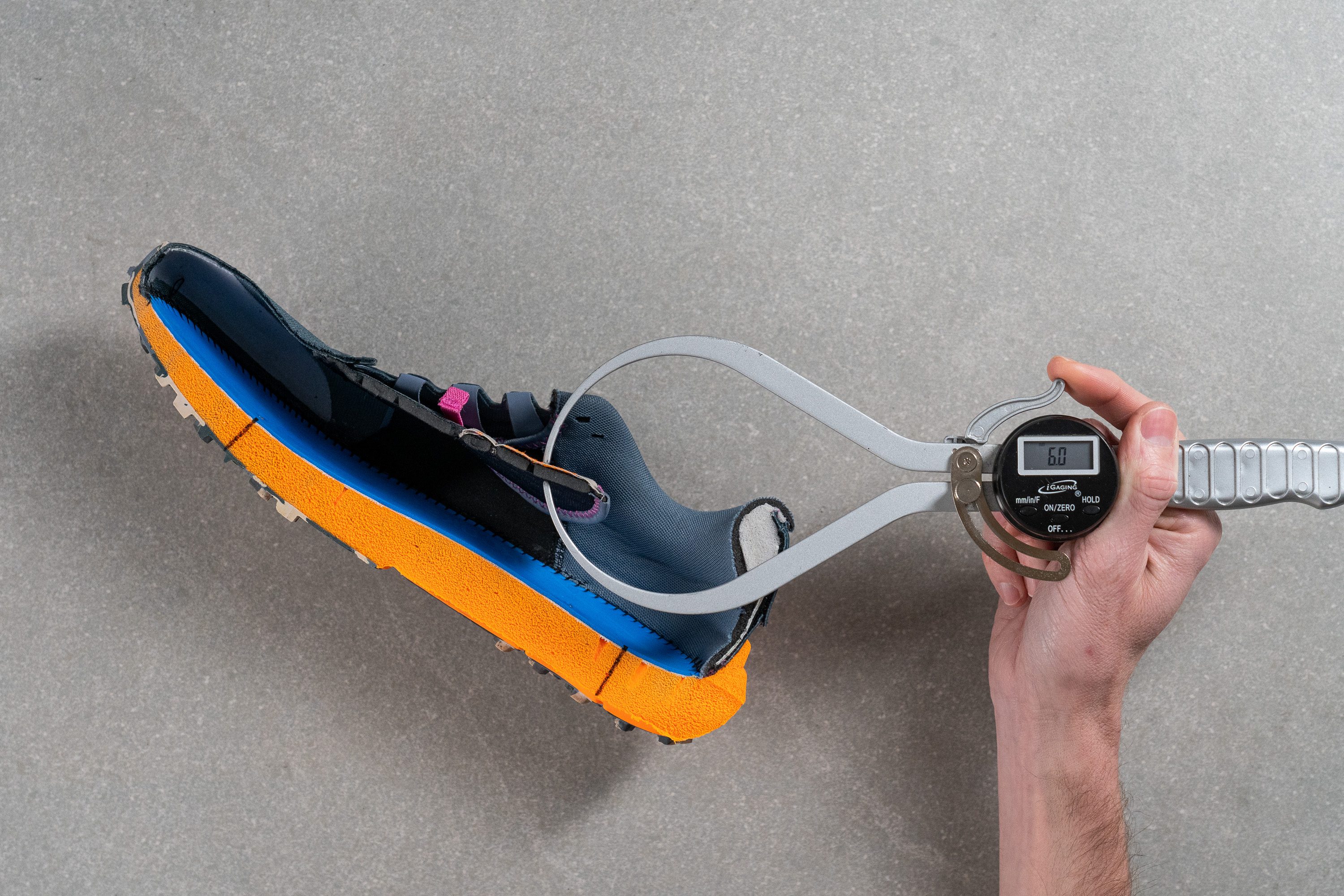
| Caldera 6 | 6.0 mm |
| Average | 6.4 mm |
Tongue: gusset type
We noticed the shoe has a semi-gusseted tongue, a reasonable choice for a heavier shoe. Yet, this design has its downsides, such as the risk of small debris getting into the shoe due to the lack of a fully-gusseted tongue.
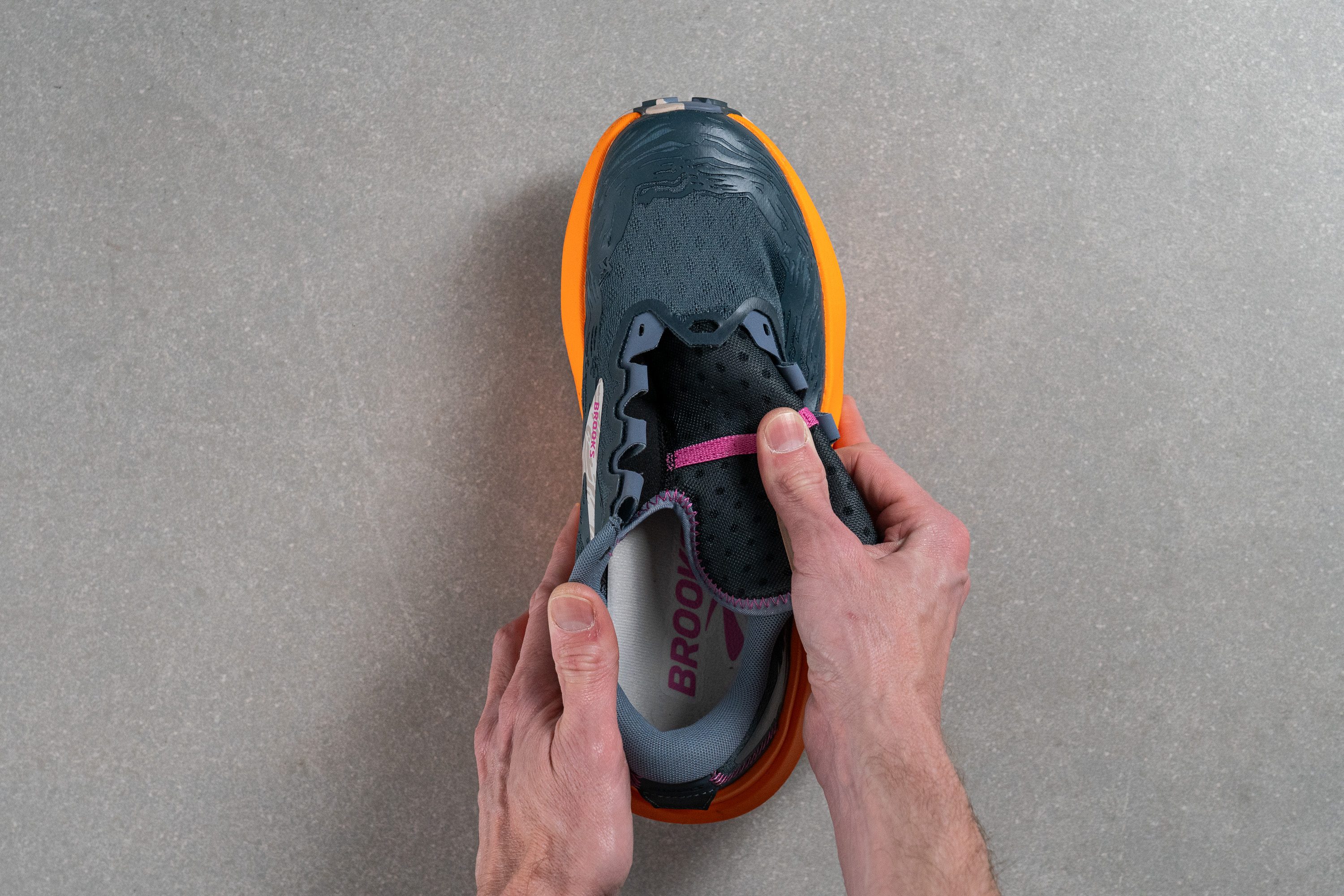
| Caldera 6 | Both sides (semi) |
Heel tab
The Caldera 6 features a convenient pull tab at the back that not only helps you slip into the shoes quickly but also serves as an attachment point for ankle gaiters.
We absolutely love this clever, dual-purpose design!
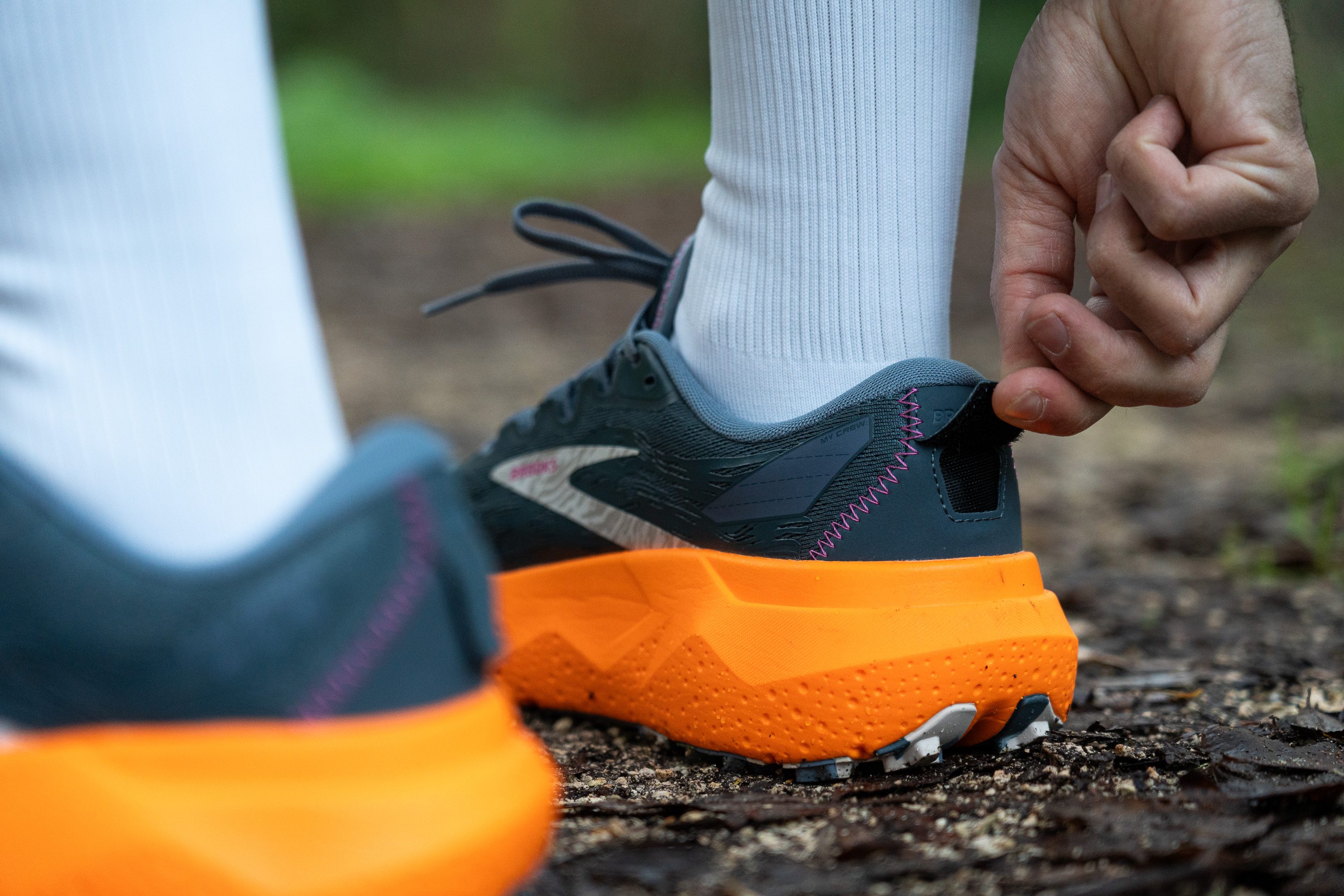
| Caldera 6 | Pull tab |

